


















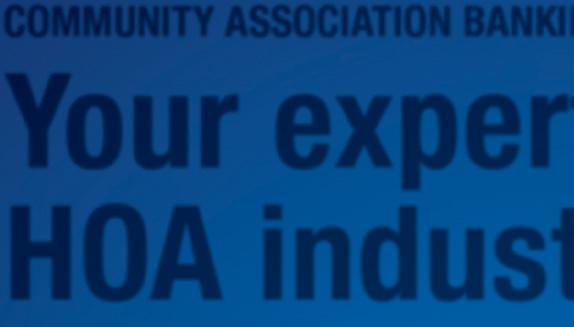


With First Citizens Community Association Banking, formerly part of the bank’s CIT division, you can count on continued service from the experts you know. And as one of the nation’s top 20 banks, we offer market-leading products matched with innovation and award-winning1 technology to help you grow your business. Your community association management company deserves no less than a financial provider that can bring you the scale, service and capabilities you need to stay ahead.
Jolen Zeroski, VP, Regional Account Executive jolen.zeroski@firstcitizens.com | 213-604-1746


firstcitizens.com

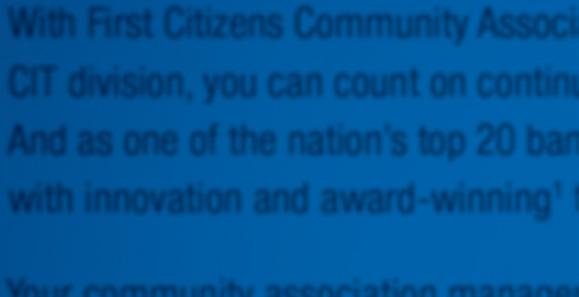
NEW BUSINESS PARTNERS
AUTOMATION PRIDE
Mrs. Dana Pride (760) 423-6567
danapride@automationpride.com
BROWN & BROWN
Mr. Michael Hughes, CMCA (503) 219-3245
michael.hughes@bbrown.com
COMMUNITY ASSOCIATION FINANCIAL SERVICES, LLC

Mr. Doug Bothe (760) 323-7475
doug@cafshoa.com
EAGLE ROOFING PRODUCTS
Mr. Greg Morrow (909) 633-2191
gregm@eagleroofing.com
NEW MANAGER MEMBERS
DESERT RESORT MANAGEMENT
Ms. Nuvia Cervantes (760) 324-1873 ncervantes@drminternet.com
TRI PALM UNIFIED OA
Ms. Kelly Nelson (760) 343-5256 tpuoa.tpe@gmail.com
RENEWING MANAGER MEMBERS
MILLENNIUM COMMUNITY MANAGEMENT, LLC
Ms. Maria Fierro (760) 834-8948
maria@mcmiskey.com
THE GAFFNEY GROUP INC.
Mrs. Jacquelyn Smith (760) 327-0301 jackie@thegaffneygroup.net
NEW HOMEOWNER LEADERS
AMERICAN VILLAGE HOA
Ms. Elaine F. Anisko
CANYON COUNTRY CLUB ESTADOS
Michael Rossman
CANYON SANDS HOMEOWNERS ASSOCIATION
Ms. Barbara Decker
Mr. John Karas
Mr. Frank King
Ms. Marla Mozan
Ms. Susan Taylor
JACK IVEY RANCH HOMEOWNERS ASSOCIATION
Ms. Ana Duran
VISTA MONTANA
Mr. Andrew LaRue
Ms. Sharon Misseldine
Mr. Ed Swafford
RENEWING HOMEOWNER LEADERS
JACK IVEY RANCH HOA
Ms. Kelly Maheu
Ms. Lynn Ross
MEAGHAN GAFFNEY-HOWE, CMCA, AMS CHAIR
The Gaffney Group, Inc.
RODNEY BISSELL, CO-CHAIR Bissell Design Studios, Inc.
ASHLEY LAYTON, PCAM, AMS, CMCA CO-CHAIR
Premier Community Association Management
JENNIFER JAMES, ESQ. BOARD LIAISON
HOA Legal Services
CHRISTOPHER BAIR
Securitas Security Services
BRIAN BERCE
Golden Alliance Insurance
SIERRA CARR, CMCA, AMS, CCAM, PCAM Associa Desert Resort Management
GREG GRITTERS
Vintage Landscape
GLENN A. MILLER, CGCS
Southwest Landscape & Maintenance, LLC
JAMIE PRICER
Coachella Valley Water District
JASON SAVLOV, ESQ. Adams | Stirling, PLC
STEVEN SHUEY, PCAM
Personalized Property Management (Ret.)
CHRIS SIGLER, B.S.C.E, CDT C.L. Sigler & Associates, Inc.
LORENA STERLING, CAFM
Community Association Financial Services
CREATIVE DIRECTOR & GRAPHIC DESIGNER
RODNEY BISSELL Bissell Design Studios, Inc. rodney@bisselldesign.com (714) 293-3749
9
SUBSCRIBER SERVICES
The Coachella Valley HOA Living Magazine is a publication expressly prepared for association leaders, managers and related business professionals of the Community Associations Institute. Members are encouraged to submit articles for publishing consideration. All articles accepted for publication in HOA Living are subject to editing and rewriting by the HOA Living Committee.
Julie R. Balbini, Esq., Fiore Racobs & Powers, A PLC
Micha Ballesteros, Cartwright Termite & Pest Control, Inc.
Roxi K. Bardwell, Advanced Reserve Solutions, Inc.
Rodney Bissell, Bissell Design Studios, Inc.
Kimberly Burnett, DSI Security Services
Gary Butler, Asphalt MD's
Linda Cardoza, Alliance Association Bank
Will Cartwright, Cartwright Termite & Pest Control, Inc.
Todd Chism, PatioShoppers
Angel Christina, Delphi Law Group, LLP
Lori Fahnestock, Powerful Pest Management
Dea Franck, Esq., Epsten, APC
Julie Frazier, Frazier Pest Control, Inc.
Elaine Gower, The Naumann Law Firm, PC
Michael Graves, SCT Reserve Consultants
Amanda Gray, Harvest Landscape, Inc.
Jennifer James, Esq., HOA Legal Services
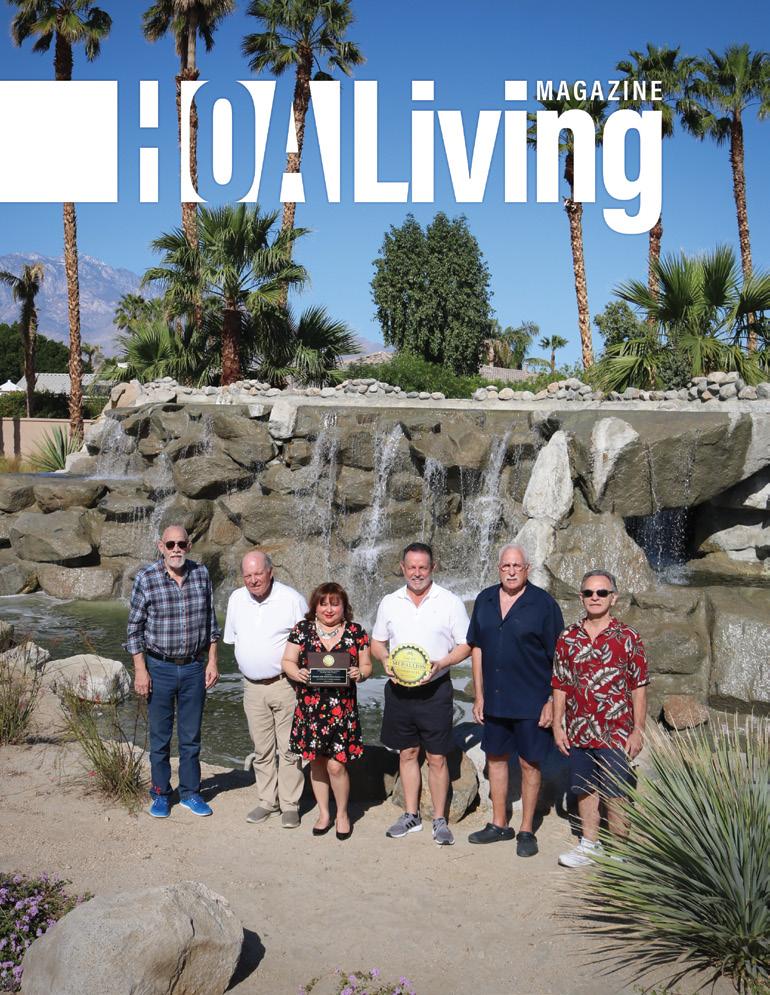
Erin Kelly, Banc of California
Megan Kirkpatrick, Kirkpatrick Landscaping Services
Jared Knight, Vista Paint Corporation
Katy Krupp, Fenton Grant Mayfield Kaneda & Litt, LLP
Matt Lawton, CIC, CIRMS, Prendiville Insurance Agency
Larry Layton, Kirkpatrick Landscaping Services
Alison LeBoeuf, Sherwin-Williams
Mike Mastropietro, OCBS, Inc.
Chris Meyer, Asphalt MD's
Greg Morrow, Eagle Roofing Products
Fran Mullahy, Conserve LandCare
Bridget Nigh, BEHR Paints
Matt Ober, Esq., Richardson Ober DeNichilo LLP
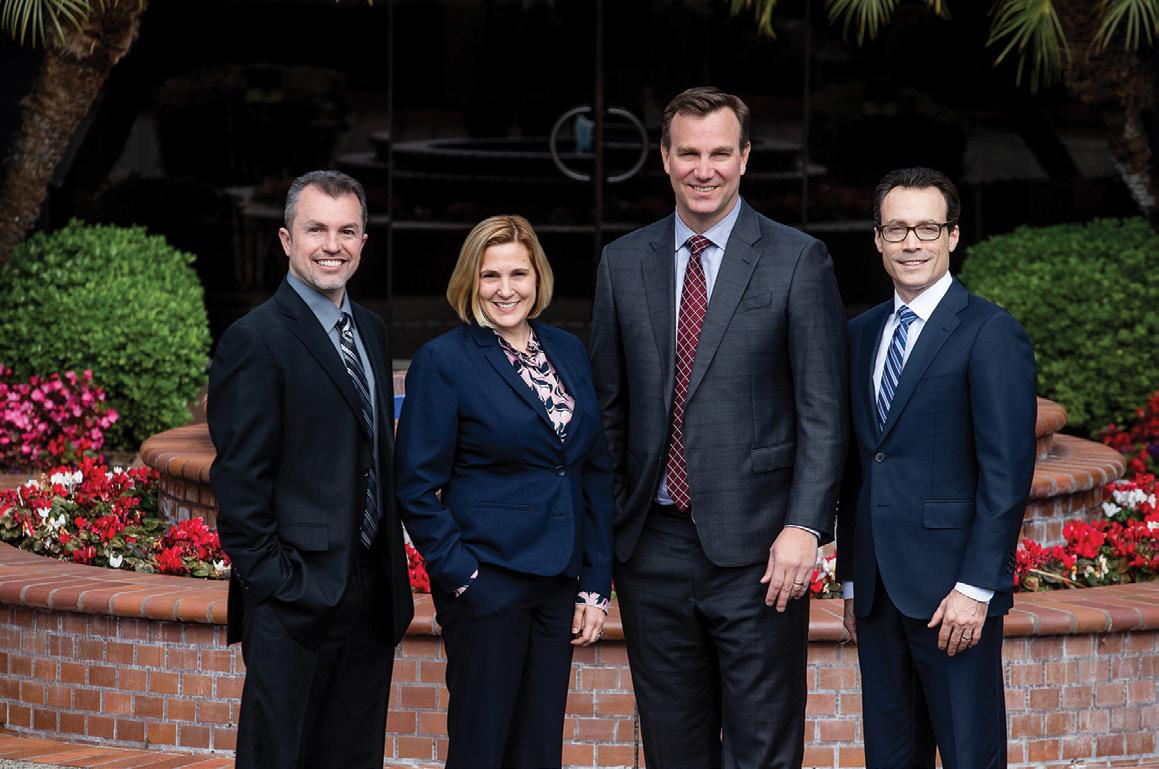
Chet Oshiro, EmpireWorks
Mallory Paproth, SCT Reserve Consultants
Elisa Perez, Esq., Epsten, APC
Jay Powell, Ben's Asphalt
Dana Pride, Automation Pride
Mike Rey, Rey Insurance Services
Kelly Richardson, Esq., Richardson Ober DeNichilo LLP
Brent Sherman, Animal Pest Management Services, Inc.
Liz Williams, AMS Paving
Taylor Winkle, Roof Asset Management
Bevan Worsham, AMS Paving
Jolen Zeroski, CIT Become
2023
COACHELLA VALLEY
CHAPTER BOARD OF DIRECTORS
PRESIDENT
JULIE BALBINI, ESQ.
Managing Attorney, CV Office, Fiore Racobs & Powers, A PLC
PRESIDENT-ELECT ERIN KELLY
AVP, HOA Senior Manager
Banc of California
SECRETARY
BG (RET) GUIDO PORTANTE
Director, Mira Vista at Mission Hills HOA
TREASURER
JOLEN ZEROSKI, CMCA
VP, Regional Account Executive First Citizens Bank
DIRECTOR
CLINT ATHERTON, PCAM
General Manager, Sun City Palm Desert
DIRECTOR
MARK DODGE, CMCA, AMS Branch President & CEO
Associa Desert Resort Management (DRM)
DIRECTOR
JENNIFER JAMES, ESQ.
Attorney, HOA Legal Services
DIRECTOR
BRUCE LATTA, CMCA
Manager, Indio Properties/President, Desert Cities HOA Council
DIRECTOR
MICHELLE LOPEZ, CMCA, AMS Director of Community Management, Powerstone Property Mgmt.
DIRECTOR
BRIDGET NIGH
Regional Account Manager, BEHR Paint Company
DIRECTOR
LILY ORTEGA, CMCA
Office Manager, Pro Landscape
CONTACT US
CAI Coachella Valley 49950 Jefferson Street, Suite 130-117 Indio, CA 92201
(760) 341-0559 | www.cai-cv.org
CAL LOCKETT
Executive Director
clockett@cai-cv.org
The materials contained in this publication are designed to provide our members with timely and authoritative information; however, the CAI Coachella Valley Chapter is not engaging in the rendering of legal, accounting or other professional types of services. The Coachella Valley Chapter has not verified and/or endorsed the contents of these articles or advertising. Readers should not act on the information contained herein without seeking more specific professional advice from legal, accounting or other experts as required.
By Coachella Valley Water District By Christopher Bair By John Schuknecht, CMCA, AMS By Christina Baine DeJardin, Esq.
It’s nearly “Season,” and I know our board and manager members are running at full speed, getting things ready for the Snowbirds to return. Please be assured that CAI-CV members are here to help. You can rely on CAI experts and professional advisors to assist with many HOA decisions. To find the right professionals, go to the CAI-CV directory: 2023 CAI-CV Directory by CAI-Coachella Valley Chapter - Issuu, or call the CAI-CV office for assistance. You have a great backup team with CAI-CV management companies and business partners.
As we approach the holiday season, many associations will see a rise in disputes of all varieties, with one thing in common – angry people and dangerous situations. With that in mind, the Programs Committee has scheduled a phenomenal program about dealing with anger & deescalating dangerous and contentious situations. Internationally renowned attorney and mediation trainer, John Edward, JD, from the High Conflict Institute, will be our guest speaker. This will be a breakfast program, at 8:00 a.m. on Friday, October 13, at Sun City Palm Desert. We expect a packed room, so sign up early! This is a program you won’t want to miss.
(See page 21)
The Education committee will be bringing community board members and managers some focused education on the topic of insurance in October. CAI-CV will join with the Desert City HOA Council, at 9:30 a.m. on Tuesday, October 3, for a free Zoom class taught by past CAI-CV president, Matt Lawton, CIC, CIRMS, and Patrick Prendiville, CIRMS, from Prendiville Insurance Agency. On Thursday, October 5, managers and assistant managers will be invited to an insurance class taught by Brian Linehan and John Schuknecht, CMCA, AMS from LaBarre/Oksnee Insurance Agency.
Have you ever experienced axe throwing or competed in a stein-holding contest? Here’s your chance. Join us, at 5:30 p.m. on Friday, October 20, for CAI-CV’s annual Oktoberfest celebration at Sunshine Landscape. You will have a wonderful time, networking and building friendships with CAI-CV members. Participants will receive beer, outstanding food, gifts, and the opportunity to win door prizes and a grand prize. This was the Chapter’s highest attended event last year. I hope to see you there! (See page 17)
You can sign up for these programs at: Community Calendar - CAI-CV. Also, the Monday Update (emailed to all members every Monday), now includes links to all the events for the second half of the year, and links to HOA Living Magazine. And if you are on social media, be sure to follow CAI-CV on Facebook, Instagram and X (formerly Twitter). On Facebook, our Social Media Committee is now putting out a Tuesday Tickler, as a reminder of events coming up for the Chapter. All of these platforms also contain links to where you can register for all of our events. (Please see page 44 for upcoming events and programs.)
Our sincere thanks to our outstanding guest speakers, Mark Dodge, CMCA, AMS (Associa Desert Resort Management) and Dan Goodrich, PCAM, LSM (Sierra Dawn Estates), and moderator, Dea Franck, Esq. (Epsten), for an amazing program on September 22, on the topic “Nuisances – Pets & Humans Alike” at Sun City Palm Desert. Check out the photos on page 22.
I also want to thank Mike Graves, RS and Mallory Paproth, from SCT Reserve Consultants, for an excellent program for community managers and board members about reserves and long-term planning. This was a combined Board Member Workshop (BMW) and Manager on the Run (MOTR) on September 14. For any of our members who missed this program, a recording is available at www.cai-cv.org.
I hope to see all our members at one of our upcoming events or programs!
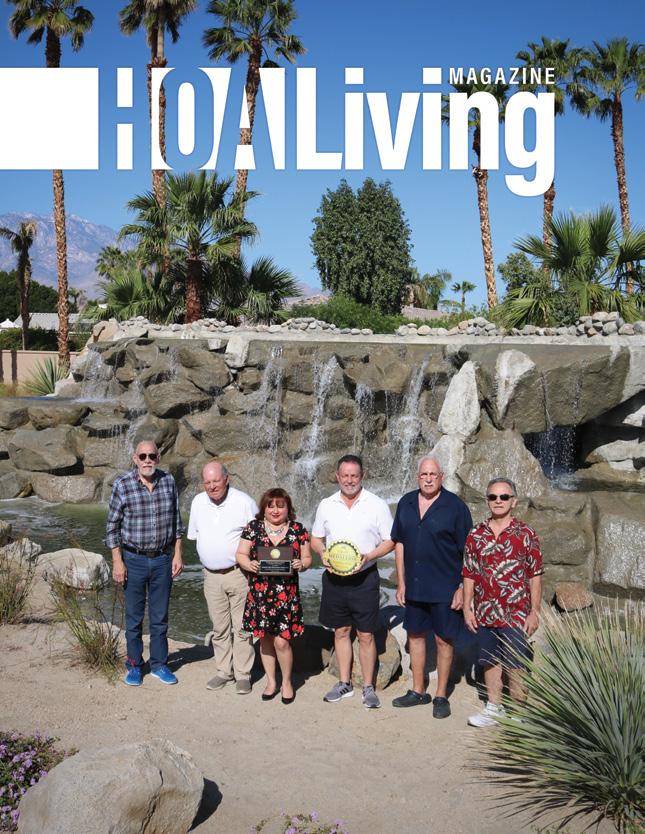


The good news is that 98% of homeowners are friendly, reasonable, and supportive of HOA leadership. The bad news is that an inevitable part of being a board member is dealing with a few angry homeowners. For example, homeowners who receive a rule violation letter, neighbors who complain about other neighbors who do not follow the rules, and complaints regarding maintenance and repair issues.
I believe that one of the reasons it is difficult to get homeowners to run for a board position or get involved with a committee is that people are not equipped or comfortable handling angry or difficult homeowners. These are their neighbors and they do not want to “rock the boat” and create ill feelings with people in the neighborhood. There is no easy way around it but there are ways to diffuse difficult situations and work to resolve each incident in a fair and equitable manner.
As a retired hospital administrator, I learned there were certain strategies that provided me with a road map when dealing with anger from employees, doctors, staff, and patients. Many of the following strategies can be employed by HOA board members when dealing with difficult and angry homeowners.
Stay calm and proceed in a respectful manner.
· Use HOA rules and governing documents to help guide you on the right course of action to take. If an angry homeowner is objectively presented with a concise review of the rules surrounding their issue, this may help to de-escalate the situation. Ultimately, board members are representing the association and trying to follow the organizing principles all homeowners have agreed to live by. Homeowners need to understand that there are consequences for not following rules and there must be consistency in enforcing them. However, you can establish protocols
"...THERE ARE WAYS TO DIFFUSE DIFFICULT SITUATIONS AND WORK TO RESOLVE EACH INCIDENT IN A FAIR AND EQUITABLE MANNER."
like providing courtesy email notices prior to issuing a violation letter which is an appropriate way to be fair and unnecessarily punitive.
· Listen and try to understand the situation from all angles. Acknowledge the complaint and respond in a reasonable and timely manner.
· Gather relevant and pertinent facts to help resolve the issue. Stick to the facts, try to be non-judgmental and do not be swayed by emotions, opinions, allegations, personal feelings, or biases. Escalation of difficult encounters can be a source of potential lawsuits which is usually not in anyone’s interest.

Communicate in a clear manner and try to build a rapport with the homeowner. Try to be as direct as possible to avoid misunderstandings.
Make sure that the board follows up and is ready to explain and back up its actions with proper documentation. It is important to keep everybody in the loop about what action is being taken to settle the situation. This shows that the homeowner is being heard and that the board is trying to help resolve the situation in a fair and equitable manner.
· Board policies, procedures, rules, and regulations are oftentimes not clear. The board may need to acknowledge this fact and rectify the situation. The board must be transparent and make changes if legitimately warranted.
· It is also critical not to dive in alone! Reach out to fellow board members or other colleagues who have more experience with difficult encounters. Your property management company is an excellent resource to mentor board members in any situation and provide guidance on the best options to help remedy difficult situations.
CAI-CV is another great place to get helpful advice and mentoring at networking events and workshops.
Based on my experience, being a board member can be rewarding by allowing you to contribute to the well-being of the community and making sure that it is effectively and efficiently run. However, dealing with angry or difficult homeowners can wear board members down, increase “burn out” or create a lack of interest in serving on the board. This can negatively impact the board’s ability to function. By employing some of these strategies, board members can gain more confidence in managing the affairs of the community, reduce frustrations, and help maintain good relationships between homeowners and the board.
Tony Michaelis is the Board President of Montage at Mission Hills, a 128 home HOA in Cathedral City. He is a retired hospital administrator at UCLA Medical Center.

"... DEALING WITH ANGRY OR DIFFICULT HOMEOWNERS CAN WEAR BOARD MEMBERS DOWN..."
I’ve heard people say, “I’m too busy, I don’t have time for that class.” I’m here to say that is pure nonsense! I’ve heard others say, “I took that class and learned so much that saves me a tremendous amount of time!” I have personal experience confirming that this is so true.
Management as a career is relatively new. It is barely 50 years old and still evolving. New understandings and techniques are coming around every day. Keeping up with them requires time and effort. CAI makes the effort fairly easy.
Back in the mid-70s, there were no designations for community association manager qualifications. Heck, for that matter, there wasn’t any community manager education. CAI recognized the need for specific education that addressed community association management, also known as HOA management. It was becoming very clear that “property management” was more for commercial properties and apartments. Community associations had a board of directors charged with the responsibility of maintaining the value of community assets and maintenance of common area facilities, along with enforcing the rules established within the governing documents. These boards of directors had little or no direction on how to accomplish any of it. The management style of property managers included little or no understanding of how to operate and manage a community association, much less deal with a board of directors.
Now we have a full array of education specifically designed because community association management is seen as being very complex. The laws that govern these common interest developments are being revised and updated on a regular basis. Methodologies on how communities should be maintained are very different for the diverse types of communities. Technology is changing frequently, too.
Managers, once seen as mere clerks and “rent
collectors,” are now seen as professional advisors to the board of directors. Those seen as being better educated are well respected for their knowledge when consulting with and managing communities. The managers who do not stay educated go through life wondering why they are not respected, even though they work hard for the community. The answer is simple: educated managers have a confidence in “knowing,” and it shows.
Designations are now available to help present the confident manager to the board of directors. More and more boards of directors are seeking properly credentialed managers who
have designations showing they have the knowledge needed to adequately manage the community.
As a manager, you absolutely need to stay educated. It starts with the M-100 course, Essentials of Community Association Management. Following successful completion of that course, along with a moderate amount of experience, a manager can be tested to receive the Certified Manager of Community Association (CMCA) designation. This designation expresses to the board of directors and all residents in the community that, as the community association manager, you possess a good understanding and are qualified to be the manager of the HOA.
After two years of direct experience as a manager, and completing two more advanced courses of education, along with the designation of CMCA, you can apply for the next level of designation, Association Management Specialist (AMS). The additional education required can be taken during the two years of service, gaining experience as a manager. The education can be any two of the six M-200 series courses. These courses are specialty education in Facilities, Communications, Leadership, Governance, Risk Management (Insurance), and Financial Management. Although any of these courses would be good, I would recommend taking the two where you feel you have the greatest need.
Once you have received the AMS designation, you should, without taking a break, move forward toward obtaining the designation of Professional Community Association Manager (PCAM). Before you can apply for the PCAM designation you must have 5 years of direct management experience. Further, you must complete all six of the M-200 series courses and take a final exam which consists of completing a case study
on a community. The application for the final exam (case study) is very detailed and requires information on how you spent your time serving the industry and the communities you managed. You are expected to have served as a volunteer in your local chapter of CAI, written newsletter articles, and perhaps even presented yourself as a guest speaker for an educational function.
Does this sound pretty intense? That’s because it is! You are applying for a PCAM, the highest designation in the country. This designation is now recognized internationally, so I guess you could say it is the highest designation in the world. After you have completed your case study, you will know why you can be seen as the highest quality professional manager, worthy of the fee demanded for your service.
If you are considering making community association management your career of choice, education needs to be a high priority. If you haven’t already done so, you should get started today. If this sounds expensive, you should know that scholarships may be available for those who need financial assistance.
There is an additional specialty designation for the PCAM who wants to go a step further, managing a very large-scale community. Its designation is Large-Scale Manager (LSM). An LSM candidate must have a minimum of ten years of
"AS A MANAGER, YOU ABSOLUTELY NEED TO STAY EDUCATED. IT STARTS WITH THE M-100 COURSE, ESSENTIALS OF COMMUNITY ASSOCIATION MANAGEMENT."
community association management experience or five years of community association management experience and five years of municipal management or a comparable position of responsibility at the executive level or hold a Master's Degree in Public/Business/ Parks & Recreation Administration.
At this point you might be asking, “Are there other careers serving community associations that offer designations?” The answer is yes!
Management companies can obtain the designation of AAMC (Accredited Association Management Company). Reserve analysts can obtain the designation of RS (Reserve Specialist).
Insurance professionals can obtain the designation of CIRMS (Community Insurance and Risk Management Specialist). Each of these designations has specific qualifications, and using a service provider with one of these designations will ensure you are dealing with a qualified professional.
Further, almost any of the business partners who serve community associations can obtain the Educated Business Partner distinction. Having this distinction shows that they know how to serve a homeowners association in a way that benefits the community.
Board members who serve their community also have an opportunity to be educated, but that is a conversation for a different article.
If I haven’t made my point clear, I’ll say it again: You should do whatever it takes to stay educated!
Steven Shuey is a retired community association consultant from Personalized Property Management in the Coachella Valley. He still serves on the Education Committee, serves on the chapter strategic planning committee as a past board member, and maintains his designation as a certified professional community association manager (PCAM). He serves on the National Faculty of CAI and is a past board member of the APCM. He may be contacted at IslandMgr@aol.com.
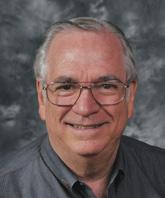
JANUARY
Monday 1 New Year's Day Office Closed
Tuesday 9 BMW, 8:30 A.M. Zoom
Friday 12 Leadership Training, 9 A.M. - 1 P.M. RAP Conference Center
Monday 15 MLK Day Office Closed
Friday 19 Lunch Program, 11:15 A.M. Sun City Palm Desert
Saturday 20 City of Indian Wells Board Workshop Indian Wells VUE Grille
Tuesday 23 Strat. Planning 2:30 P.M., Board 3:30 P.M. Zoom
Friday 26 Annual Awards Event, 5:30 P.M. Agua Caliente Casino & Spa
FEBRUARY
Tuesday 6 BMW, 8:30 A.M. Zoom
WE - SA 14-17 CAI National Law Seminar Las Vegas
Friday 16 Breakfast Program, TBD Sun City Palm Desert
Monday 19 President's Day Office Closed
Tuesday 20 Strat. Planning 2:30 P.M., Board 3:30 P.M. Zoom
MARCH
Monday 26 CMCA Rev/CID Law/Ed BP, 9 A.M - 1 P.M. RAP Conference Center
Tuesday 5 Board Certificate Course, 9 A.M. - 4 P.M. Zoom or TBD
Saturday 9 City of Indio Board Workshop Sun City Shadow Hills Clubhouse
Friday 15 Lunch Program, 11:15 A.M. Sun City Palm Desert
Tuesday 19 Strat. Planning 2:30 P.M., Board 3:30 P.M. Zoom
APRIL
MAY
Friday 22 Meet the Management Cos, 5:30 P.M. Classic Club
Tuesday 9 BMW, 8:30 A.M. Board Bootcamp Zoom
Friday 19 Lunch Program, 11:15 A.M. Sun City Palm Desert
Tuesday 23 Strat. Planning 2:30 P.M., Board 3:30 P.M. Zoom
Friday 3 Spring Golf Tournament, 7:30 A.M. Sun City Palm Desert
Tuesday 7 BMW, 8:30 A.M. Zoom
WE - SA 8-11 CAI National Conference Las Vegas
Friday 17 Lunch Program, 11:15 A.M. Sun City Palm Desert
Tuesday 21 Strat. Planning 2:30 P.M., Board 3:30 P.M. Zoom
JUNE
Monday 27 Memorial Day Office Closed
Tuesday 4 BMW, 8:30 A.M. Zoom
Friday 7 Annual Comedy Night, 5:30 P.M. Sun City Palm Desert
Wednesday 19 Juneteenth Day Optional Holiday
Friday 21 Breakfast Program, TBD Sun City Palm Desert
Tuesday 25 Strat. Planning 2:30 P.M., Board 3:30 P.M. Zoom
JULY
TH - FR 4-5 Independence Day Office Closed
Friday 12 Annual Bowling Tournament, 5:30 P.M. Palm Springs Lanes
Tuesday 23 Strat. Planning 2:30 P.M., Board 3:30 P.M. Zoom
Friday 26 CAMDAY, 9 A.M. - 5 P.M. Sun City Palm Desert
AUGUST
Tuesday 20 Strat. Planning 2:30 P.M., Board 3:30 P.M. Zoom (Optional)
Friday 23 Strategic Planning, 9 A.M. - 1 P.M. RAP Conference Center
SEPTEMBER
Monday 2 Labor Day Office Closed
Tuesday 10 BMW, 8:30 A.M. Zoom
Friday 20 Lunch Program, 11:15 A.M. Sun City Palm Desert
Tuesday 24 Strat. Planning 2:30 P.M., Board 3:30 P.M. Zoom
OCTOBER
Tuesday 8 BMW, 8:30 A.M. Zoom
Monday 14 Columbus Day Office Closed
Friday 18 Breakfast Program, TBD Sun City Palm Desert
Tuesday 22 Strat. Planning 2:30 P.M., Board 3:30 P.M. Zoom
Friday 25 Oktoberfest Sunshine Landscape
NOVEMBER
Tuesday 5 BMW, 8:30 A.M. Zoom
Friday 8 Fall Golf Event, 1:30 P.M. Shadow Mountain Golf Club
Friday 15 Lunch Program - Leg. Update, 11:00 A.M. Sun City Palm Desert
Tuesday 19 Strat. Planning 2:30 P.M., Board 3:30 P.M. Zoom
TH - FR 28-29 Thanksgiving Office Closed
DECEMBER
Friday 6 Annual Wine & Spirit Tasting Shields Date Garden
Friday 6 BMW/MOTR Shields Theater
Tuesday 17 Strat. Planning 2:30 P.M., Board 3:30 P.M. Zoom
Friday 20 Optional Holiday Breakfast/Lunch Sun City Palm Desert
TU - WE 24-25 Christmas Holiday Office Closed
Tuesday 31 New Year's Eve Office Closed
JANUARY 2025
Friday 31 Annual Awards Event, 5:30 P.M. TBD



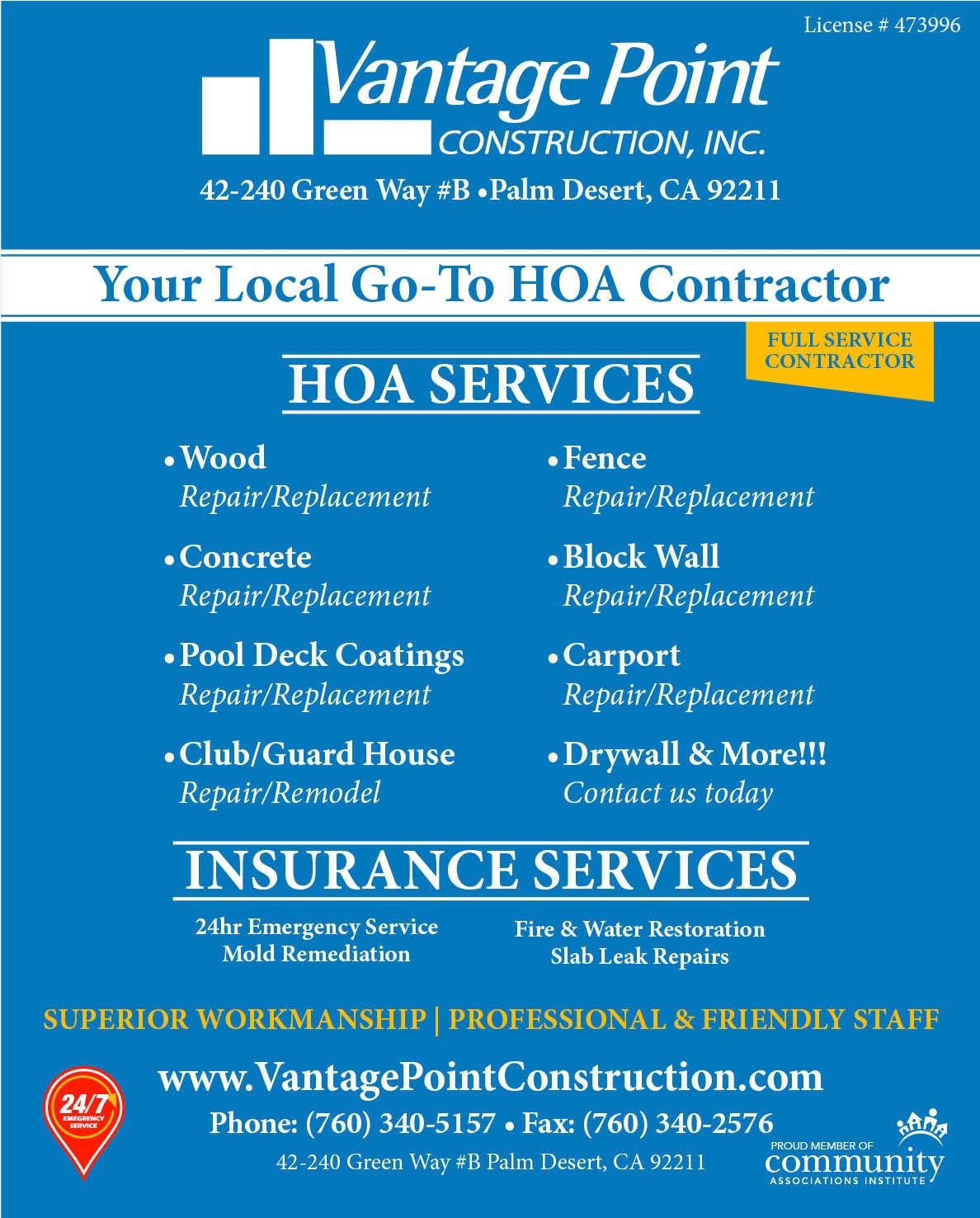
In high school, Mike was caught digging a pool behind the football field… by hand! Today he remodels pools! Was there ever any doubt?
Remodeling pools and Back yards since 1969 Qualit y work at a fair price
 Lic #896061 C-53
Lic #896061 C-53
COST: $30


In this article I will often refer to the abbreviated term “HCPs”, to mean high conflict people or people with high conflict personalities. This term was, and some of the methods described in dealing with them were, developed by Bill Eddy, LCSW, Esq., the founder of the High Conflict Institute, www.HighConflictInstitute.com. For a more complete description of the personality types that we often find in HOA conflicts, I urge you to go to the High Conflict Institute website for some helpful education.
It is expected and understood by most people in the legal profession that because of the intensely personal nature of the issues that come up in family law, many if not most cases in family court will be driven by high conflict personalities (HCPs). What is not so expected and understood is that the same personality driven conflicts that generate high conflict family law cases are the driving force behind much of the HOA conflicts that the courts and mediators see today.
In other cases, lawyers resort to high pressure tactics and threats to convince the other side to capitulate. Although this tactic may be effective in some cases, it often drives HCPs in the other direction.
Now I know that with HCPs the “issue” is not the issue, the personality is the issue, and I also know that in the context of an IDR session or mediation, that personality is not going to change. In HOA mediations, I am often asked or “tasked” with making someone understand a certain reality. Legal arguments are made and repeated, but usually to no avail. The lifelong pattern of thinking and behavior that dominates the HCP personality is not going to change in the limited time allotted for mediation!
The HCP in a non-family law civil case is no more likely than an HCP in a family law case to have insight into his or her own behavior as the cause of a problem. The life-long enduring pattern of blaming others for all of life’s difficulties (which may very well have been the reason why the case is in court) is not going to disappear because of some well-crafted legal reasoning.
When homeowners feel that their rights to enjoy their property are being infringed, it is almost always the case that the “issue” is the personality as opposed to a complicated legal issue.
Lawyers are well trained to spot and analyze legal and factual issues, and then to achieve their goals by persuading others to see and understand the facts and law (the issues) as they have analyzed them. In my years as a trial lawyer and early years as a mediator, and before I understood the nature of high conflict personalities, I was frustrated by those cases in which legal reasoning and logic, the stock and trade for a lawyer, seemingly meant nothing. I couldn’t get my point across, but I kept trying, as if saying it repeatedly it might somehow sink in.
If we aren’t likely to resolve the conflict by legal reasoning and persuasion, and if threats don’t work, what can be done? Most importantly, we must remind ourselves what we shouldn’t do. First and foremost, remember that HCPs are not logical thinkers and they do not respond well to negative feedback, therefore we must resist the urge to admonish or even advise them.
WE DON’T WANT TO FIGHT, BUT IF WE FEEL LIKE WE ARE BEING ATTACKED, WE MUST REMIND OURSELVES THAT THIS ISN’T ABOUT US, IT IS ABOUT THE HCP’S INABILITY TO MANAGE HIS OR HER EMOTIONS.
Also remember that the HCP’s behavior is fear driven, which may lead them to want to fight. We don’t want to fight, but if we feel like we are being attacked, we must remind ourselves that this isn’t about us, it is about the HCP’s inability to manage his or her emotions.
The most important skill for those of us dealing with an HCP is to establish and maintain a connection with the HCP. How we communicate, both with what we say and how we say it is critical. With a connection to the person, we can begin the process of looking forward to a reflective discussion wherein possible consequences can be considered along with possible resolutions. Without a connection, we are likely doomed to the endless cycle of defensive thinking and behavior that characterizes the HCP mindset.
One of the most effective skills that can be employed to interrupt the HCP’s need to defend themselves and assign blame to someone else, is to allow their version of the case to go unchallenged. With no challenge to their version, it is less likely they will have a need to defend. Not challenging is not the same as agreeing, there is no need to do that either. Respectful, empathetic listening goes a long way. “You might be right” are powerful words in this setting. Stay calm, show empathy, attention, and respect (E.A.R.).
Our goal is to turn the focus on the past into proposals to resolve the issue before us today. When a person concentrates on the future, they won’t be stuck in the past. The past is about blame, the future is making choices. Most HCPs have the capacity to solve problems when they are not stuck in a reactionary state of mind that makes them feel they must fight.
It’s pretty simple to get the HCP to make a proposal for resolution, just ask. If you have prepared for the IDR or mediation by explaining to all the parties at the outset of the proceeding that your focus will be on making proposals for resolution instead of hashing over the past, they will be “primed” so that when the time comes to make one, they won’t be surprised. By this part of the process, you should have developed a connection with this person. You have been respectful and empathetic, no matter how extreme their position or behavior might be.
Getting a proposal, of course, doesn’t guarantee resolution. The cycle of blame often begins again once the initial proposals are exchanged. Do not despair, because once again you will have the opportunity to focus on the future, not the past. With empathy and respect, just ask the party to focus on a new proposal and forego criticizing the other party’s proposal. It’s not uncommon for the parties to get stuck at
this stage. Early in my career, I felt that the outcome was my responsibility and that if it didn’t settle, I had to take over and make something happen. Now, I have learned that sticking to the process and letting go of the outcome is more likely to lead to successful outcomes.
No matter how wedded to the conflict the parties appear to be, at some level of consciousness they usually want the conflict resolved. I have done my job if I helped them understand their BATNA (Best Alternative to a Negotiated Agreement). If they come to a rational, logical conclusion that they are better off continuing in court, then that is what they should do. It’s their case, it’s up to them. On the other hand, if their decision not to settle is based on reactive, defensive thinking and I have been unsuccessful in helping them calm down and engage their logical brain, I won’t have been successful. I don’t tell the parties what they “should” do, rather we discuss what they “could” do.
HOA conflicts can become very heated, and once the parties seek out lawyers to resolve the conflict it often escalates rather than resolves, so let's do our best to keep it from going that route!
John C. Edwards is a mediator for West Coast Resolution Group in San Diego, specializing in real estate, HOA, and probate mediations. He is also on the faculty of the High Conflict Institute, which provides educational seminars to professionals on how to manage high conflict personalities. His Case Manager is Smhale Leon, sleone@westcoastresolution.com.
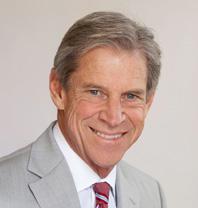
WHEN A PERSON CONCENTRATES ON THE FUTURE, THEY WON’T BE STUCK IN THE PAST.
If you have a grass lawn, you may be familiar with “overseeding.” This is the process of scalping summer grass, laying new seed, and watering until a fresh green lawn takes over. However, this is not a common practice in other areas, so why do we do it in the Coachella Valley?

The extreme heat of our summers can be damaging to all but the hardiest of turf grasses, so we typically plant Bermuda grass for its tolerance against heat and drought. Unfortunately, Bermuda grass is perennial and tends to go dormant during our coolest weeks of winter, when its green color fades to gold. For winter, local gardeners often plant cool-season ryegrass. To get the new seed to germinate, the soil and seed must be kept moist at all times. This results in wasteful water use and a bare lawn for a few weeks during the transition between Bermuda and ryegrass.
"AS WATER AGENCIES FOLLOW THE STATE WATER BOARD’S DIRECTIONS TO REDUCE WATER BUDGET ALLOCATIONS, SOME CUSTOMERS MAY SEE EVEN HIGHER WATER BILLS THAN NORMAL THIS FALL IF THEY CHOOSE TO OVERSEED."

After recent drought years in California, the State Water Board has passed legislation known as Making Conservation a California Way of Life. This translates to decreased water budget allocations, which are metrics used to determine billing tiers for water customers.
Average water use by customers in the Coachella Valley trends wastefully high during the months of October, November, and December because of this practice of lawn overseeding. As water agencies follow the State Water Board’s directions to reduce water budget allocations, some customers may see even higher water bills than normal this fall if they choose to overseed.
Coachella Valley residents already use more water per capita than customers in other parts of California. The time has come for us to stop overseeding our lawns and look for alternatives, such as:
1. Replace some or all of your turf grass with desert landscaping. All six water agencies in the Coachella Valley now offer a rebate for turf removal. This means almost any local resident who would like to replace grass with desert landscaping can do so at little to no cost after rebates. Call your water agency or check its website to learn more.
2. Use non-toxic grass paint to green up your Bermuda grass as it goes dormant. With a couple of bottles of grass paint and a garden sprayer, you can paint your lawn yourself. A 16-ounce bottle of concentrated grass paint will cover 300 square feet. Mix with water and spray.
3. Do nothing and let the Bermuda grass turn gold in winter. It will turn green again as winter ends and the weather warms up.
4. If you choose to overseed anyway, don’t do all the grass around your house. Limit the overseeding to one irrigation zone, and wait until November to lay the seed, as it takes less water to keep the seed and soil moist in cooler weather. Click or scan the QR code and follow the instructions.
For more information, visit www.cvwatercounts.com. Reprinted with permision.
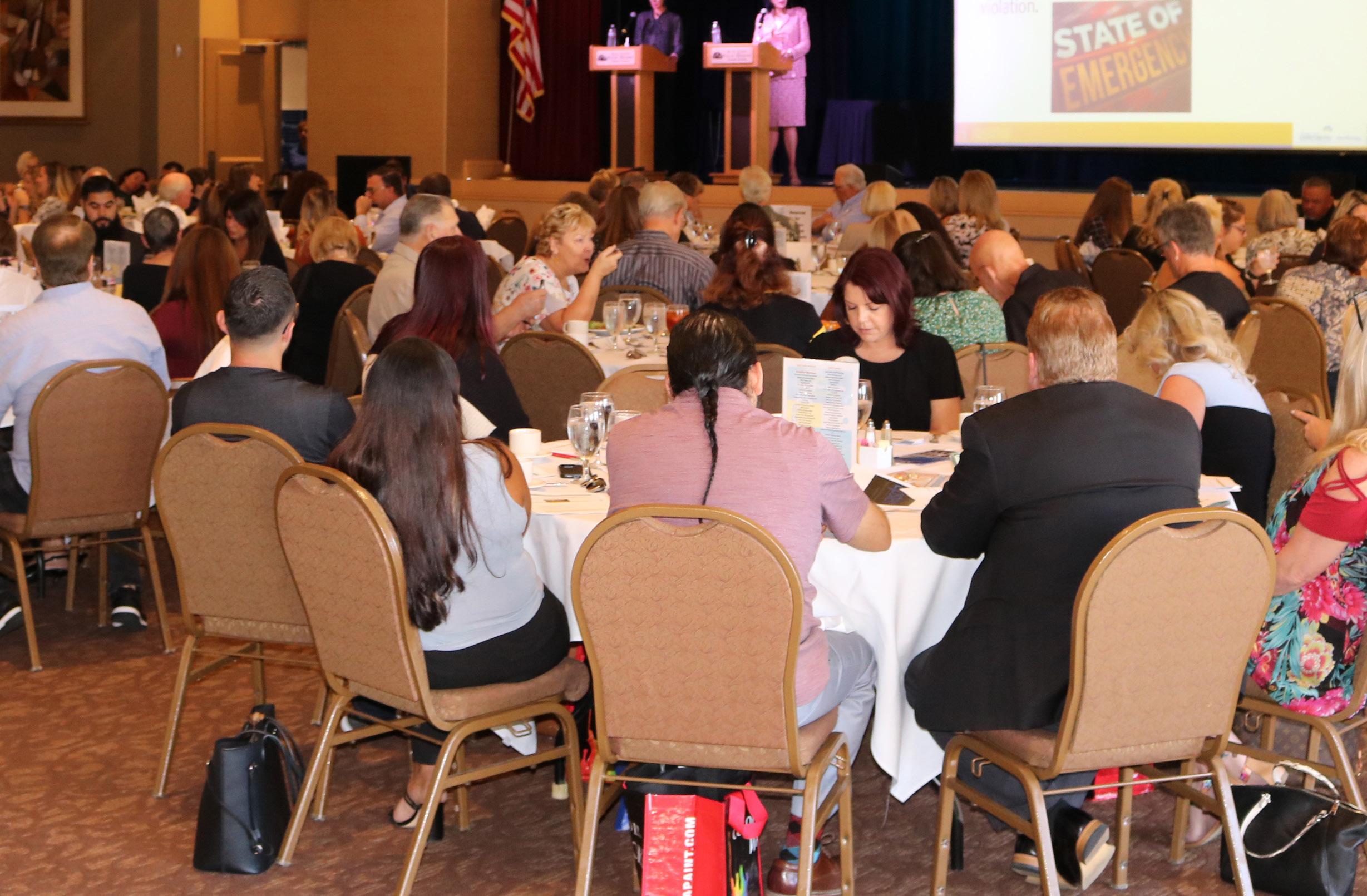
Guest Speakers

Mark Dodge, CMCA, AMS
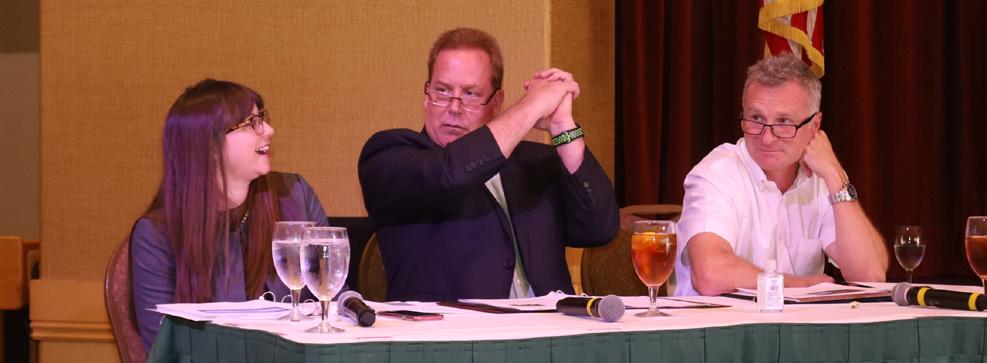

Branch President & CEO, Associa
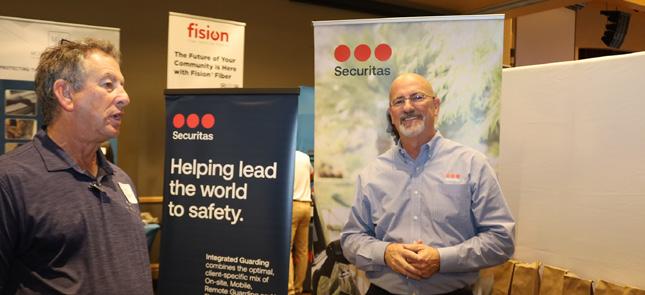
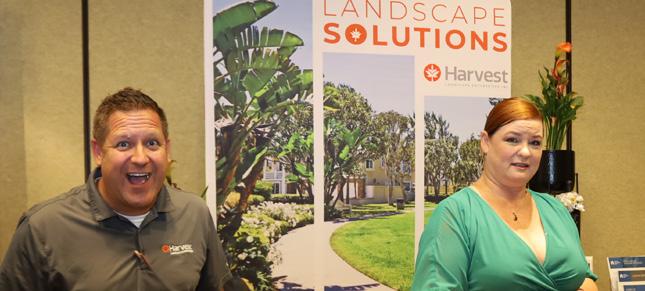
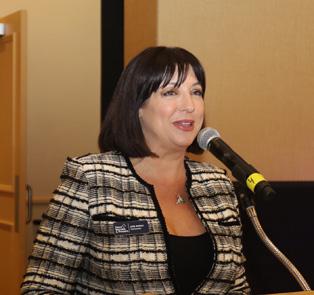
Desert Resort Management
Dan Goodrich, PCAM, LSM
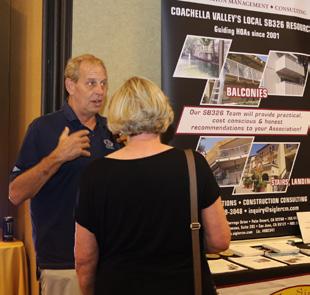
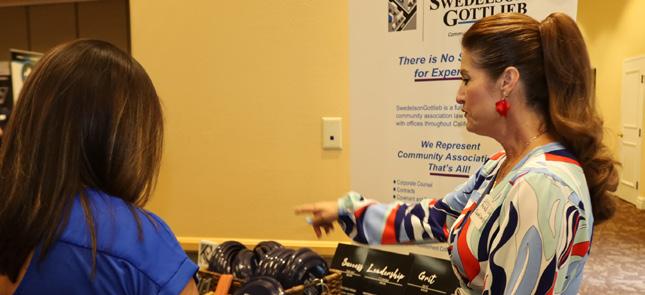
General Manager, Sierra Dawn Estates
Homeowners Association, Inc.
Moderator
Dea C. Franck, Esq.
Shareholder, Epsten, APC
Trade Show Booth Sponsors
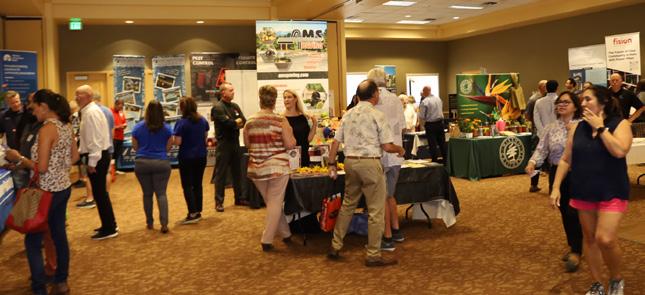
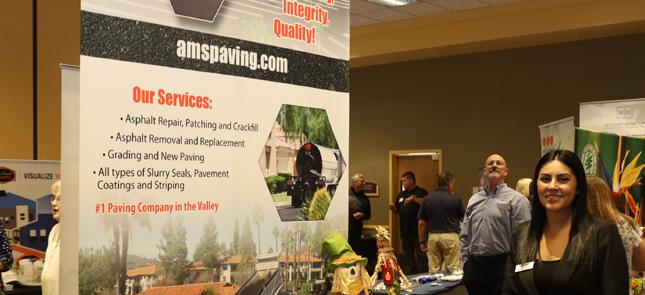


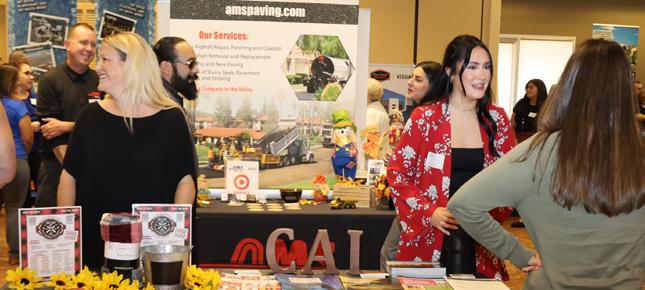
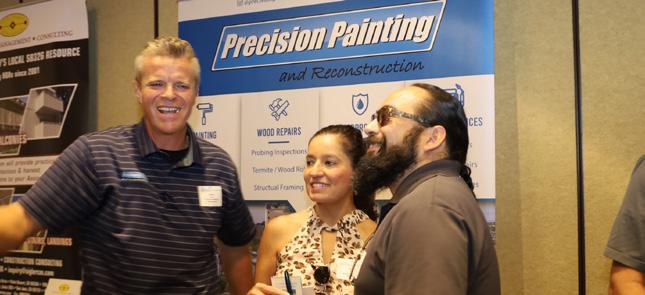
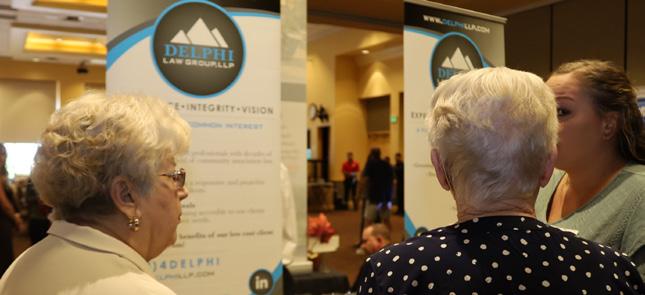
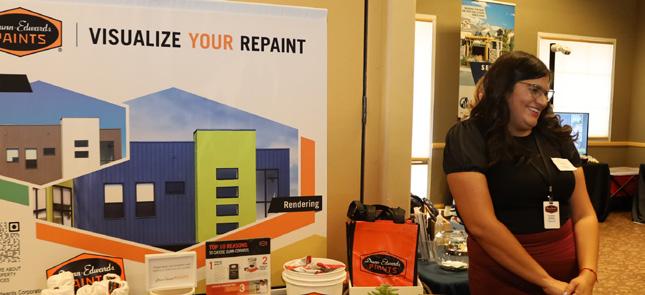
Accurate Termite & Pest Control
Alan Smith Pools
Alliance Association Bank
AMS Paving, Inc.
Canyon Print & Signs
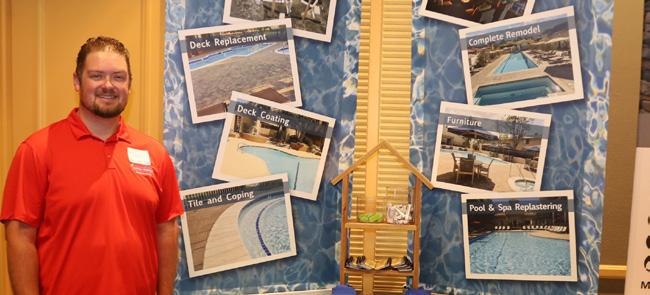
C. L. Sigler & Associates
Delphi Law Group, LLP
Dunn-Edwards Corporation
Empire Technologies Group
Harvest Landscape
Hotwire Communications
IPS
Jain Irrigation, Inc.
McKenzie Mena, LLP
Precision Painting & Reconstruction
Prendiville Insurance Agency
S. B. S. Lien Services
Securitas Security Services
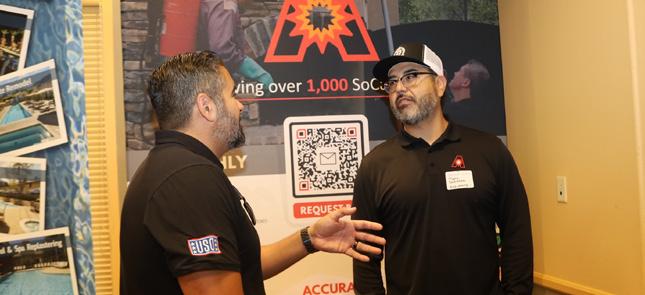
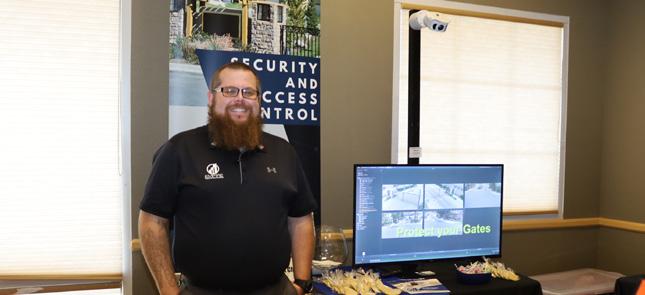
Swedelson|Gottlieb Law Firm
RESERVED TABLE SPONSORS
Associa Desert Resort Management X2
McKenzie Mena, LLP
SCHOLARSHIP SPONSOR
The Judge Law Firm, A Law Corporation
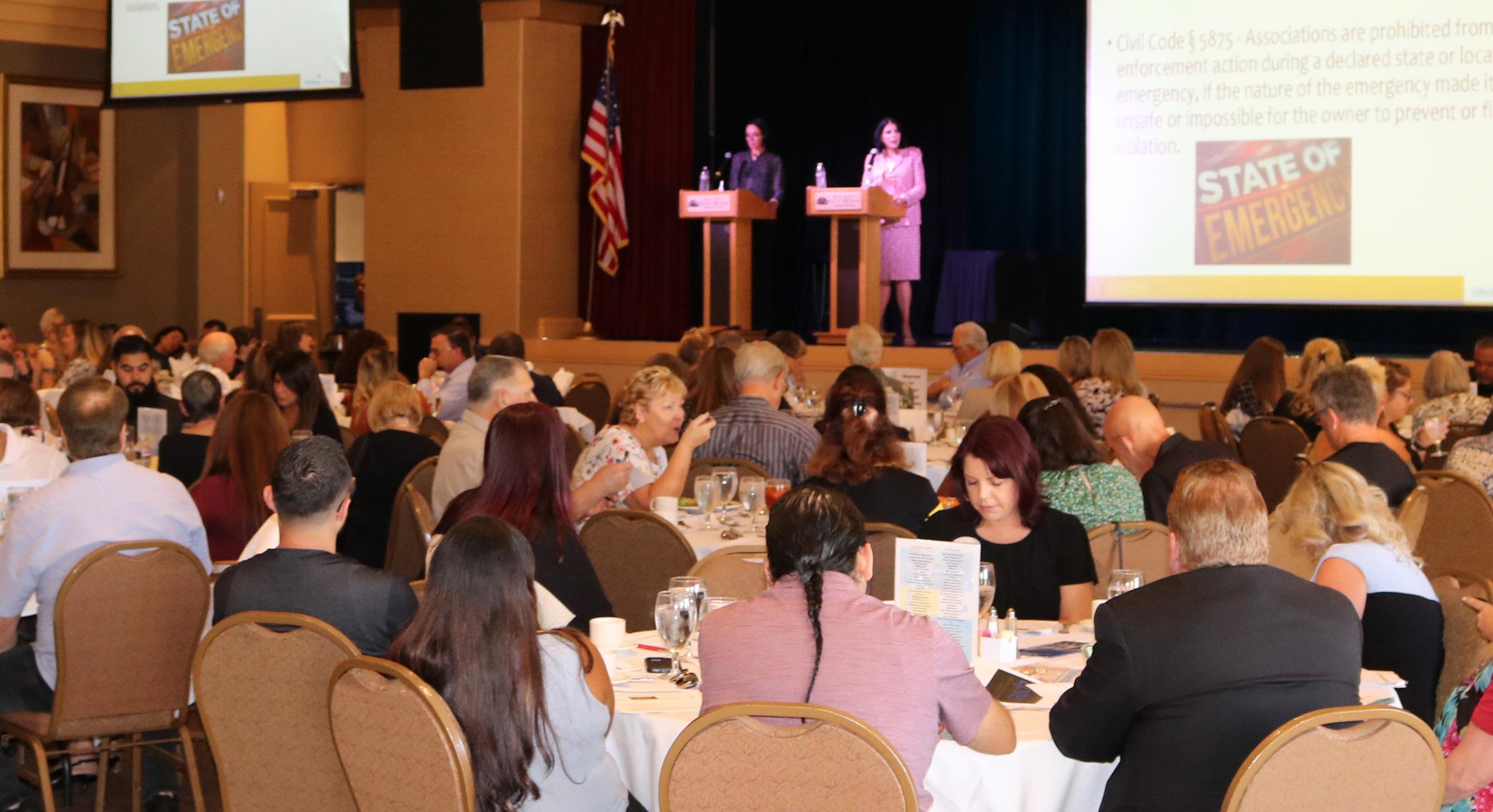
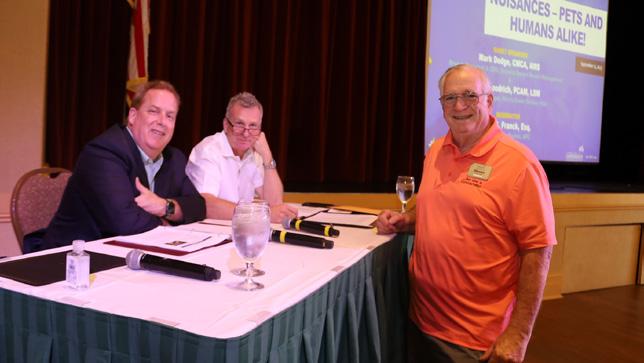
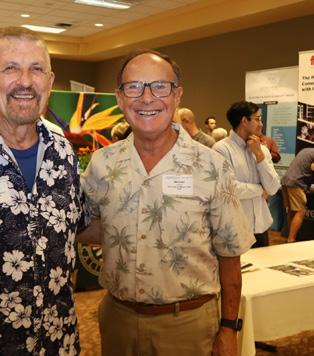

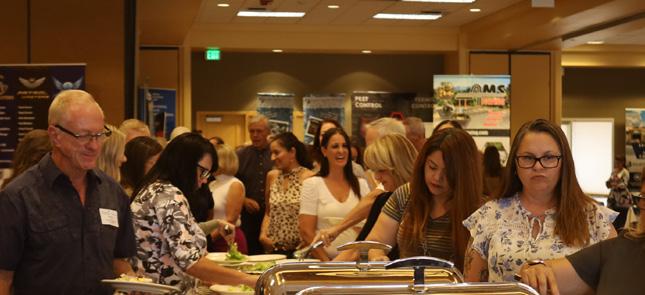
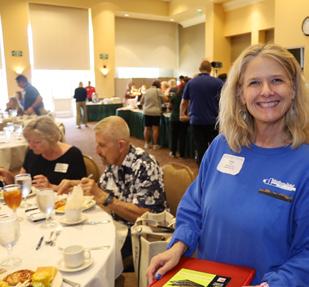
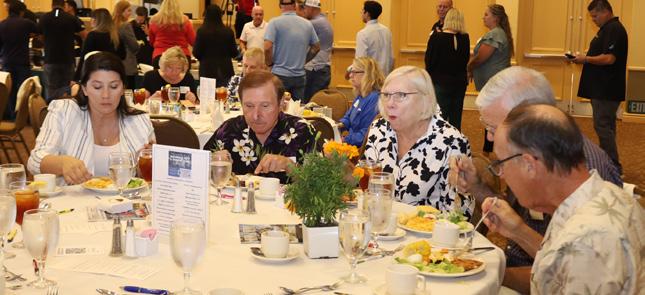
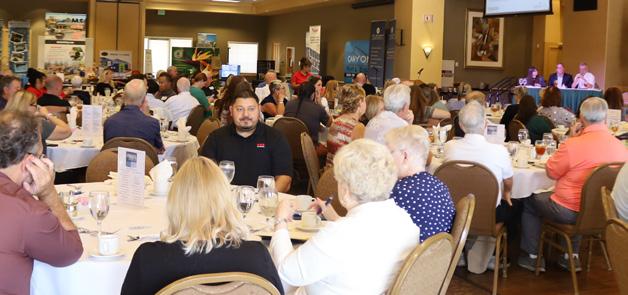
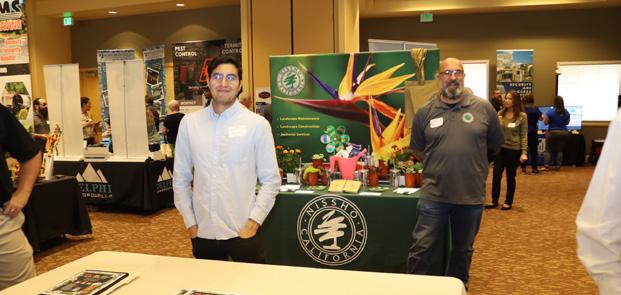
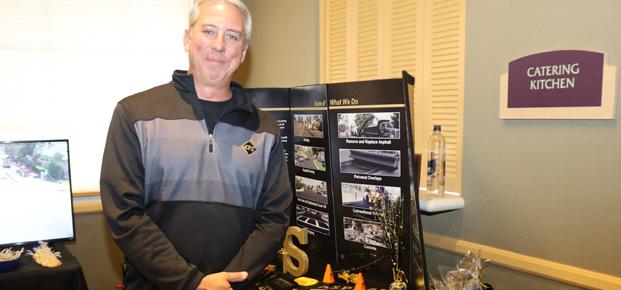
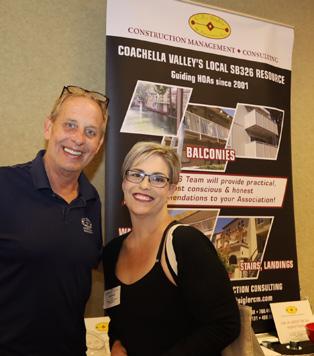
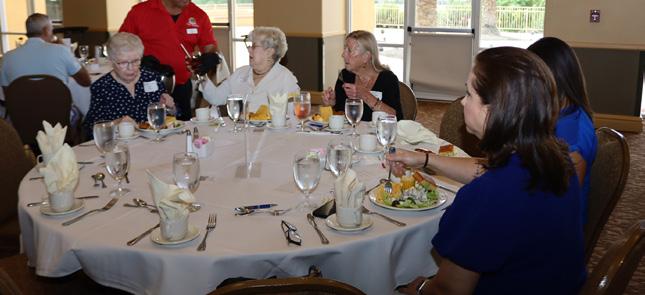
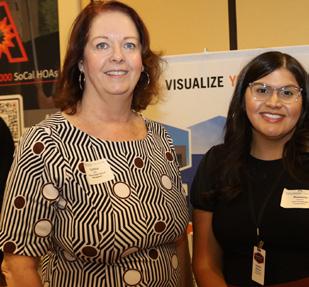
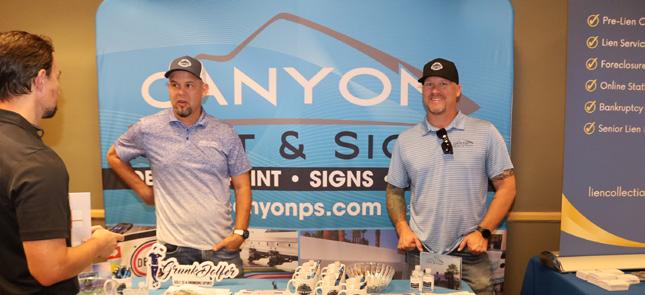
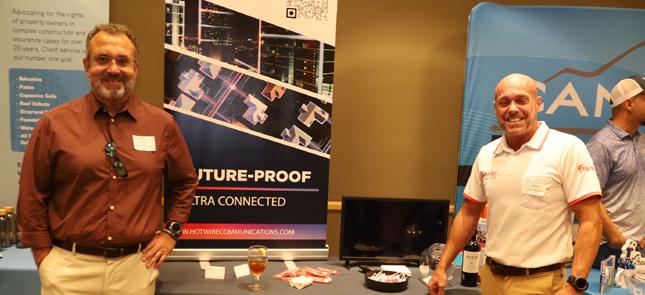
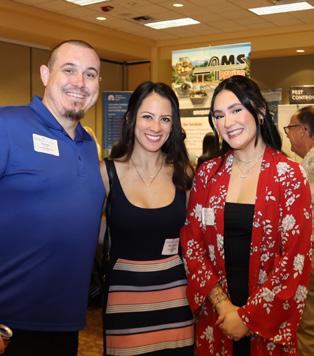

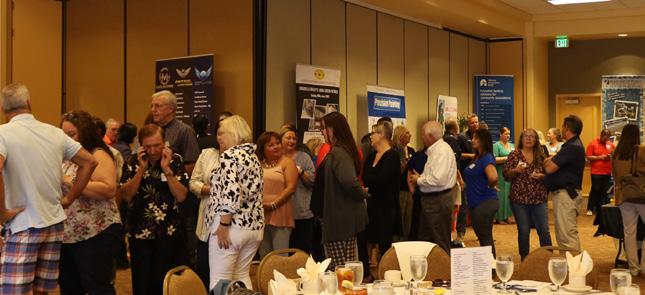
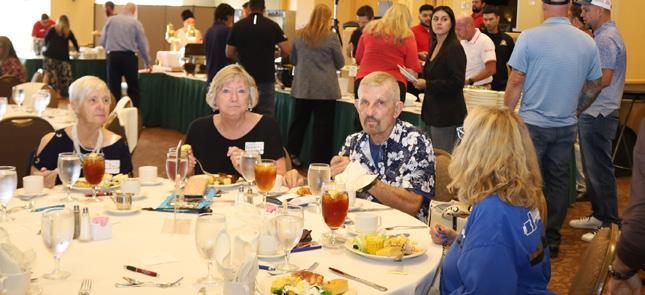
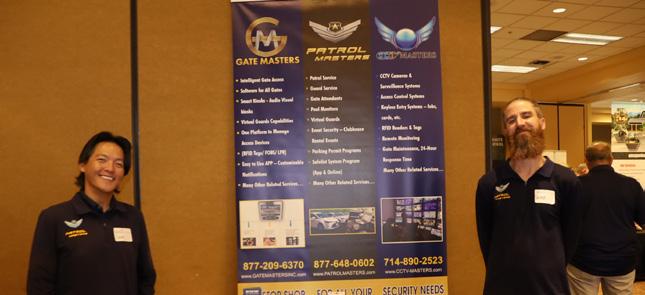
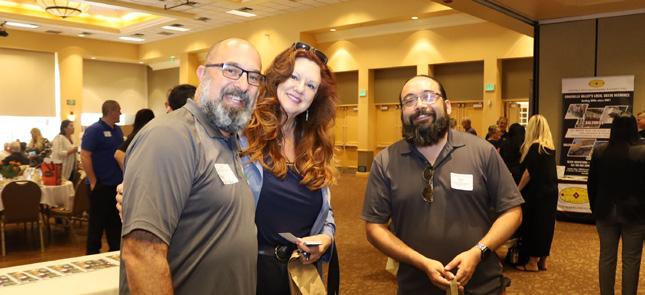
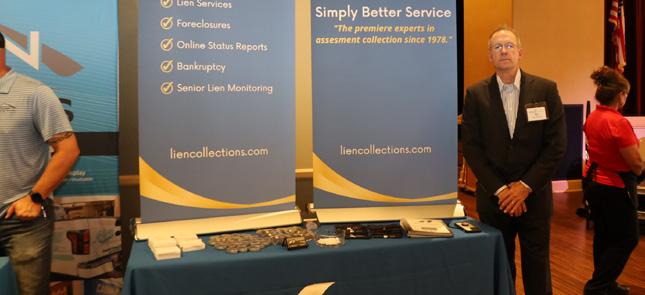
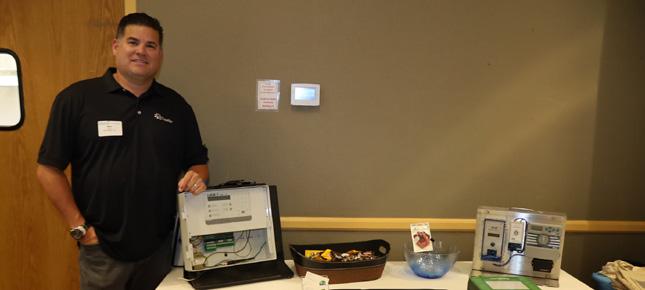
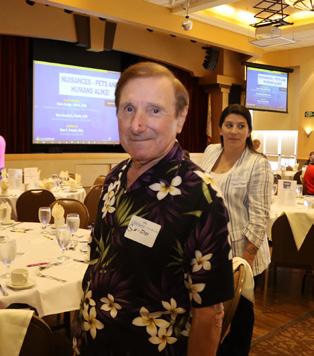
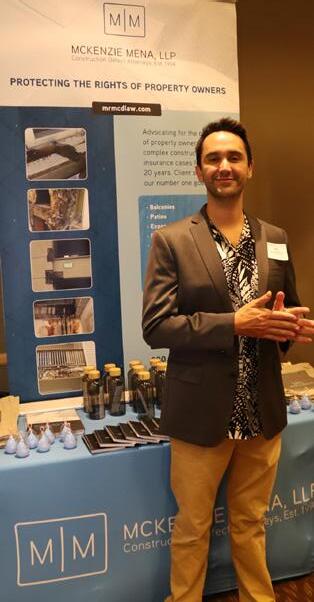

ASSOCIA DESERT RESORT MANAGEMENT
TITLE SPONSOR
PAYNE PEST MANAGEMENT
WINE TASTING SPONSOR
IVAN’S PAINTING & MAINTENANCE
TEQUILA TASTING SPONSOR
VANTAGE POINT CONSTRUCTION, INC.
GRAND PRIZE SPONSOR
REALMANAGE
WINE COASTER SPONSOR
SUN KING ELECTRIC, INC.
LIGHTING SPONSOR
AMS PAVING, INC.
COCKTAIL NAPKIN SPONSOR
DELPHI LAW GROUP, LLP
BORDEAUX SPONSOR
ASSOCIA DESERT RESORT MANAGEMENT RESERVED TABLE SPONSOR
DUNN-EDWARDS CORPORATION
RIESLING SPONSOR
LABARRE/OKSNEE INSURANCE AGENCY, INC.
WINE TASTING SCHOLARSHIP SPONSOR
BEAUMONT TASHJIAN
FRIENDS OF CLAC SPONSOR
EPSTEN, APC
FRIENDS OF CLAC SPONSOR
The Annual Election of Directors for the Coachella Valley Chapter of CAI has been scheduled for Tuesday, October 24, 2023, at 3:00 p.m. The election will be run by the third-party professional elections company, The Inspectors of Election, and ballots will be available online beginning September 22, 2023. Voting will continue online until October 23, 2023. Each CAI-CV member may cast one vote for each open seat and each member will receive one login ID and password. Ballots will be sent to the person on record with CAI’s National office. If you are a business partner who is on the CAI-CV local database but not on the CAI National database, please contact the CAI-CV office to find out where your company’s ballot information will be sent. There are three seats up for election, each for three-year terms, serving from January 1, 2024, through December 31, 2026. Board members may serve up to two three-year terms, so current board members may be running for a second term. CAI-CV members in good standing who have served recently in a leadership position (Chair, Co-Chair, Delegate) for 12 or more months are eligible to run. Nomination forms are available online at www.cai-cv. org, or by calling the CAI-CV office at (760) 341-0559. The election may be cancelled if all three current directors run for a second term, and there are no other candidates.
Hello all! For those that don’t know me, my name is Clint Atherton, and I am the current General Manager for Sun City Palm Desert. My affiliation with CAI started over 15 years ago when I was a member of the Orange County chapter where I served on the Programs Committee, Legislative Support Committee and was elected to the Board of Directors. I relocated to the CV chapter almost 10 years ago and became active and am currently on the Professional Managers Committee, the Legislative Support Committee and on the Board of Directors where I served as President in 2022.
In my year as President, we began transitioning from a virtual world as we tried to return to in person events and “business as usual.” There were setbacks and stalls as we learned to navigate how we would function moving forward, discovering “business as usual” was never going to be the same. With that realization, the Board and the CAI-CV team have diligently worked on strategic planning and shaping the direction the chapter will take in the future. I would like to remain a part of this process while continuing to get the word out about CAI and its benefits. I am a firm believer in what we do. For example, Sun City Palm Desert has received the Medallion Award to show we follow best practices. This award highlights the benefit of CAI and makes our Board and members aware of all that CAI does. In addition, as a delegate from the CV chapter to the state’s Legislative Action Committee, I am a proponent of keeping up with legislation and its impacts while informing our communities of the same. Our Association is one of the few in the Valley that participates in our Buck-a-Door campaign to help with our legislative efforts in Sacramento and would like to see other communities here be more involved as well.
I would like to carry on with the work mentioned above and appreciate all of you who have allowed me to serve with you and for you for the past three years and would like to continue doing so.
Thank you,
ClintI would like to serve on the CAI-CV Board of Directors. I have been an active and dedicated member of CAI for 20 years, and a member of CAI-CV for 15 years. As a current Board member for CAI-CV, I would like to continue serving on the Board. During my membership, I have also served on many committees, including the Social Media Committee (Current Chair), HOA Living Committee (Former Chair 2019, 2020, 2021, 2022), Volunteer Committee (former chair), Membership Committee, Programs Committee, and served as a delegate for the California Legislative Action Committee attending the Legislative Day at the Capitol in 2009. As one of the CAI teachers, I thoroughly enjoy sharing my passion and utilizing the valuable skills I learned as a former middle school teacher. I am dedicated to assisting the CAI-CV chapter and helping in any capacity possible.
Upon graduation from law school in 2001, my primary focus has been common interest communities. I am passionate about my legal career in working with HOAs and enjoy volunteering for CAI. I also enjoy and appreciate collaborative team effort and believe continuing to serve on the Board of Directors for CAI-CV is an exceptional opportunity to continue utilizing my education, experience, and skills to better our industry. Family is important to me and after years of membership and dedicated service, I truly feel the CAI community is like a family.
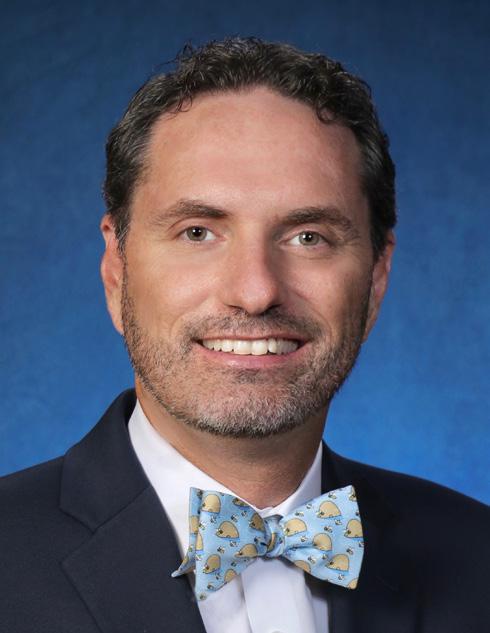
After working with two of the largest HOA law firms in both Las Vegas, Nevada and Southern California, I opened my own law practice in 2014. With my own law practice, I have a flexible schedule and can actively participate in the CAI-CV Board.
Why should you vote for me? I am dedicated to serving CAI and actively involved. I strongly believe it is important to truly listen to our members and their concerns and implement innovative ideas to accommodate changes. If given this opportunity to continue serving on the CAI-CV Board of Directors, I will continue to serve to the best of my abilities and strive to be an effective and positive member of the team. Thank you for your consideration.
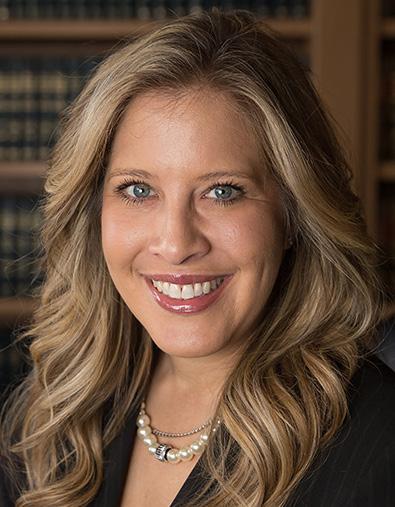

I am the current President of CAI-CV and would like to continue to serve the Chapter as President in 2024. I have been on the Board for three years and hope to serve a second term.
I have been a member of the California State Bar since 2000 and am a Shareholder and the Managing Attorney for the Coachella Valley office of Fiore Racobs & Powers, A PLC. I received my undergraduate education from Pomona College in Claremont, California, where I graduated cum laude with a Bachelor of Arts (B.A.) in Theatre. After working on and off Broadway in various capacities, I attended law school, earning my Juris Doctor (J.D.) degree from the UCLA School of Law in 2000. Prior to joining Fiore, I practiced business and real estate law. I have been exclusively representing CIDs for the past seven years and could not be happier with my decision to join Fiore and be a part of this industry.
My experience includes being Past President of the Desert Bar Association, having served as President, Vice President, Secretary, and Treasurer, along with many years as a Trustee of that organization. I am currently the President of CAI-CV and serve on the Programs Committee and as Board Liaison for the Social Media Committee. I have been involved with these committees and others for the past seven years and have served in a leadership role on the Programs Committee and the now-defunct PR Committee for most of this time. I am also very active within the CID community and especially with CAI-CV, always being happy to help whenever and wherever I am needed.
I previously served as Vice President of the Desert Theatre League, on the board of Coyote StageWorks, a local, professional Equity theatre, and on the board of the local branch of the American Red Cross. I am also an award-winning performer, having won the Grand Prize at the McCallum Theatre's Open Call Talent Competition in 2010, along with numerous Desert Star Awards from the Desert Theatre League. I continue to perform in select musical and charity events in the Coachella Valley, though that has slowed down since the birth of my children, Leonardo, who is now a little over five years old, and Alessandra, who is now 20 months old.
It would be an honor to continue serving on the Board of CAI-CV, and so I have submitted my name as a candidate. Thank you for your vote!
I would like to be reconsidered for a board seat in 2024. I served on the board for six years and my last term was completed in 2022. I am eligible to run again and would like to continue to serve the Chapter as a Director. I have been very involved with the chapter and with CAI National since terming out last year. I am on the Chapter’s Strategic Planning Committee, I serve as Chair of the Chapter’s Legislative Support Committee, and as Co-Chair of the Education Committee. I also serve on the Golf Committee, the Homeowner Leaders Committee, and the Corks for CLAC Wine Tasting Committees. With my dedication to the chapter, I think I have much to offer to help us get back to fiscal health and start building a reserve, which we need.
In addition to my local chapter participation, I am currently a Commissioner at CAMICB and a member of the CAI national Government and Public Affairs Committee as well as several task forces within each. I am also on the board of directors at the Desert Cities HOA Council.
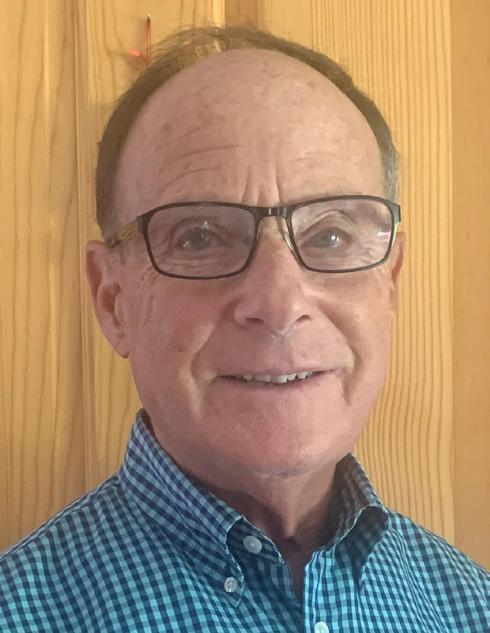
As President of my local HOA, I am very involved locally and can help our board as a homeowner leader. I think having chapter board members from each of our membership groups is important.
During 2022 I was awarded the “Homeowner of the Year” award at the CAI National Conference. My involvement with CAI National helps the chapter with recognition and information.
Thank you for your consideration.
Not since the Valentine’s Day storm of 2019 has the Coachella Valley seen flood damage to the extent created by Hurricane Hilary. First and foremost, the community association industry’s thoughts and prayers are with those who have been, and still are, being affected. While some in the area were able to make it through the storm unscathed, many were not so lucky and were forced to evacuate their homes and businesses and many of our associations also took a hit.
Second, and perhaps equally important, we owe tremendous thanks to the volunteers, service providers, first responders, and others in the community who have been working tirelessly to assist those in need. Your efforts are not lost on us.
Considering this event, let us take this time to look at how water damage is addressed by insurance; namely, the different types of losses and which policies, if any, cover them. For example, let’s say you experienced flood damage to your home, business, or community building. Many of us immediately think, “Thank goodness I have coverage for water damage.”
However, did you know that there are different types of water coverage covering different events? This is exactly why you need to know what type of insurance you have, as there is a large difference between “water damage” and “flood damage” or “rising water” which, to community associations, may seem like interchangeable or even identical terms.
First, let’s define the word, “flood”:
Noun -- An overflowing of a large amount of water beyond its normal confines, especially over what is normally dry land. Verb – To cover or submerge (a place or area) with water or to arrive in overwhelming amounts or quantities.
Generally, within insurance, the definition of water damage encompasses many situations except “flood/rising water.” The term “water damage,” is synonymous with sudden and accidental damage, such as from a broken pipe, leaking toilet, and/or condensation line leak.
Now let’s reconsider the damage to your community with this in mind, do you believe you have coverage?
Flood coverage is not something that jumps to our attention here in the desert. Our attention is always pulled more toward earthquakes but as we have seen, floods can and will happen and it’s important to know what is and is not covered within your policy or policies.
It is also extremely important for me to note (and would be irresponsible if I did not) that every carrier, and policy, is and can be different.
The moral of the story is this, if you are unsure, consult with your insurance representative to gain clarity because the one thing no one wants to experience is thinking something will be covered when it is not, especially if the damage is severe which we have seen in the desert as a result of Hilary.
John Schuknecht, CMCA, AMS is an Account Representative at LaBarre/Oksnee. John can be reached at 657-207-4789 or JohnS@hoa-insurance.com

"Generally, within insurance, the definition of water damage encompasses many situations except 'flood/rising water.'"
In an unpredictable world, preparing for the unexpected is crucial. This is especially the case when it comes to natural disasters such as storms, floods, and fires that can have devastating impacts to the well-being of homeowners and their communities. Whether there is an impending threat or if a sudden disaster strikes, having a plan in place can make all the difference in safeguarding your home and loved ones. This article will guide you through the essential steps to take before, during, and after such calamities with the goal of helping you stay safe and resilient, using the recent example of Hurricane Hilary as a reference.
Having a preventative plan for what might befall your home can be the key to a positive or negative result. There are a few important preparatory items that can ease the result of a disaster.
1. Preventative Measures – Prepare your property for minimizing the impact of a disaster:
• Storms and Floods: Stay ahead of impending storms by implementing preventative measures like sandbagging vulnerable areas, trimming trees to prevent falling branches, and securing outdoor furniture and decorations.

• Fire Preparedness: Ensure your home is fire-ready by maintaining firebreaks, clearing dead vegetation, and installing spark arresters on chimneys. Trim vegetation near your house to create a defensible space.
• Regular Maintenance: Conduct regular maintenance checks on your property, including pipes, electrical systems, windows, roof, and landscape trimming. Identify and address vulnerabilities to minimize damage during a disaster.
2. Contact List - Create a contact list that includes essential contacts like:
• Local Emergency Services: Know your local police, fire department, and emergency medical services numbers.
• Neighbors: Establish communication with your neighbors to provide mutual assistance during emergencies.
• Utility Companies: Have contact details for gas, water, and electricity providers to report any issues.
• Insurance Company: Keep your insurance company's contact information readily available.
3. Safety First – As they say in the construction world, “SAFETY PAYS”. Keep these things in mind:
• Evacuation: If authorities issue an evacuation order, follow it promptly. Your life is the most important thing to safeguard.
• Communication: Keep a batterypowered radio or mobile phone to stay informed about the situation and receive emergency alerts.
• Stay Inside: In the case of wildfires, hurricanes, or heavy rain events, stay indoors to minimize exposure. Close windows and doors and seal any gaps to prevent water or smoke from entering.
• Emergency Kit: Have an emergency kit ready with essentials like food, water, first aid supplies, flashlights, and batteries.
4. Responsibilities and Reporting –Know who is responsible for what following any damages that have occurred during a disaster:
• Homeowner Responsibilities: During the disaster, your primary responsibility is the safety of your family and property. Take necessary measures to protect your home and loved ones.
• HOA Responsibilities: Understand what your Homeowners Association (HOA) is responsible for, such as community-wide preparations, evacuation routes, and communication protocols.

5. Safety Assessment – Once it’s safe to do so, it will be important to assess your ongoing safety based upon what occurred at your home during the disaster. Of course, other officials and insurance people will also perform such assessments, but it is indeed your home, and you will want to assess your immediate safety once the “acute” disaster has passed:
• Home Inspection: Once it's safe to do so, assess your home's condition. Look for structural damage, leaks, electrical issues, or fire damage.
• Documentation: Document any damage with photographs and descriptions. This evidence will be vital for insurance claims.
6. Contacting Authorities – Depending upon the type of disaster incurred, contact the appropriate authorities:
• Emergency Services: Report any hazards, injuries, or incidents to emergency services.
• Insurance Claims: Contact your insurance company to start the claims process. Provide them with detailed documentation of the damage. (A professional mitigation company is experienced and can help with this detailed documentation.)
7. Recovery and Restoration – After things settle following the disaster as described above, it’s time to restore your home:
• Restoration: Work with reputable restoration contractors to address water damage, provide disinfecting, dry affected areas with environmental controls, and repair / restore your property to pre-loss condition.
8. HOA's Role – Involve the HOA’s board and management as needed:
• HOA Documentation: Communicate with your HOA to understand their responsibilities and obligations regarding community-wide repairs and assistance.
• Community Recovery: Collaborate with neighbors and the HOA to rebuild and recover as a community.
In the face of impending or sudden disasters like Hurricane Hilary, preparedness is key. By taking preventive measures, maintaining your property, knowing who to contact, and understanding your responsibilities and those of your HOA, you can enhance your ability to protect your home and loved ones during emergencies. Remember, staying informed, staying safe, and being resilient are the cornerstones of disaster preparedness.
Christopher J. Cellini, Flood Response LLC's Director of Sales and Emergency Services, brings over 30 years of sales and operational expertise to the Coachella Valley. Formerly the owner of Innovative Merchant Solutions of PA for 15 years before its acquisition by Intuit, he relocated to Palm Springs in 2008. A University of Miami School of Business graduate, Mr. Cellini also contributed to The Ritz-Carlton Hotel Company's leadership team in relaunching their Rancho Mirage location. He underscores the importance of cultivating relationships through honesty, integrity, and loyalty in serving the community. Mr. Cellini actively engages in valley events and charity functions and can be reached at 610-633-9346 or by email at chris@floodresponse.com.

In the tranquil realm of Desert guardgated communities, security officer professionals serve as the first line of defense, tasked with ensuring the safety and serenity of the residents and their guests. Yet, their duty extends beyond safeguarding physical perimeters; they also play a pivotal role in preserving the harmony within these exclusive enclaves, often encountering angry, impatient, and disgruntled residents, visitors, and vendors at the gatehouse. In this article, we’ll explore how these vigilant gatekeepers are trained to handle such situations, the art of de-escalation, and the importance of mutual respect.
Security officers working in gated communities undergo rigorous training to navigate confrontations with tact and professionalism. They understand that tensions may run high, and their words can diffuse or ignite a situation. Verbal de-escalation techniques are at the cornerstone of their training, enabling them to address anger and impatience with a calm and empathetic demeanor.
Officers are taught to actively listen, acknowledge resident and visitor/ vendor concerns, and communicate clearly. They are encouraged to remain composed and avoid confrontational language or actions. By doing so, they can often transform anger into understanding and ensure a smoother entry process into the community. This training not only enhances the safety of the community but also fosters a sense of security and trust among its residents.
Residents, visitors, and vendors should reciprocate the respect offered by security officers. These security professionals are diligently working to create a secure environment, which benefits everyone within the community. Residents and guests should approach the gatehouse with patience and kindness, understanding that the officers are there to uphold rules and regulations designed to maintain safety and order.
A simple smile and a courteous greeting can go a long way in establishing a positive interaction with security officers. They are more likely to respond favorably to people who treat them with respect, creating an atmosphere of mutual cooperation.
While security officers are trained to defuse most situations, there are instances when tensions escalate beyond their control. In such cases, it is essential for the officers to promptly report the incident to the property manager and/or law enforcement if needed. This ensures that appropriate action can be taken to address any ongoing concerns and maintain the overall harmony of the community.
The cooperation between security officers and management teams is crucial in handling complex situations and maintaining the well-being of the community. Residents should also feel encouraged to report any incidents or concerns to both security and management to ensure they are addressed effectively.
In conclusion, security officers serve as the initial point of contact when entering a gated community, making them the gatekeepers of both safety and hospitality. As the first image and impression a visitor encounters, these dedicated professionals play a pivotal role in creating a welcoming and secure environment. Their courteous demeanor, attentiveness, and professionalism not only set the tone for the entire community but also instill confidence in residents and guests alike. By balancing the twin priorities of safeguarding the community and extending a warm welcome, security officers ensure that every visitor's experience begins with a sense of safety and respect.
Christopher Bair is the Business Development Manager at Securitas Security Services in Palm Desert. He can be reached at: (760) 779-0728 or by email at Christopher.Bair@Securitasinc.com.

Thursday, November 16, 2023, 1:30 PM
Shadow Mountain Golf Club, Palm Desert Nine-Hole Executive Length Course
Easy-going, Relaxed, & Fun (No golf experience required)
Cost:
Sponsorships:
Tiki Hole Sponsor
Tiki Hole-in-one Hole Sponsor
Tiki Drop-on-the-green
Hole Booth Sponsor
Tiki Golf Cart Sponsor
Tiki Golf Ball Sponsor
Tiki Golf Towel Sponsor
Tiki Swag Bag Sponsor
Tiki Reserved Table Sponsor
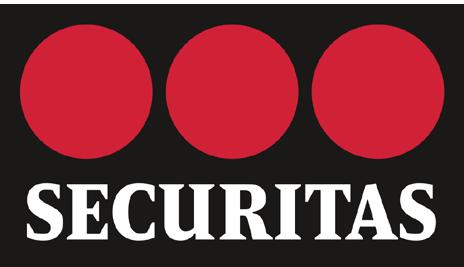
Tiki Grand Prize Sponsor
Tiki Water Bottle Sponsor
Tiki Mulligan Sponsor

Insurance premiums have been skyrocketing across the country in recent years, causing many community associations to face significant challenges in obtaining affordable insurance coverage.
More than 90% of respondents in a recent survey conducted by the Foundation for Community Association Research reported that their property and casualty insurance premium had increased at the last or current renewal with 24% citing an increase between $101 and $500, and 14% citing a larger increase.
The Foundation collected nearly 900 responses from community association leaders— board members, managers, management company executives, and insurance and risk management professionals—representing at least 10,000 community associations.



 By John Schuknecht, CMCA, AMS
By John Schuknecht, CMCA, AMS
It is officially October, or “Spooky Season” for many. For most associations it is also “Budget Season” and what can always be spooky for boards and managers is preparing the upcoming annual budget.
While many associations always factor in increases and/ or potential increases from landscape vendors, pool service companies, or increases to the reserve account (to provide a few examples), do not forget to take insurance into consideration when working on your upcoming budget.
The commercial property insurance market is a difficult landscape, with various factors driving up the cost for premium coverage. Here are some of the key contributors to these rising costs:
Major disasters such as hurricanes, floods, wildfires, tornadoes, and winter storms have caused insured losses of over $100 billion globally in five out of the last six years. In 2022, the total insured losses were estimated at $140 billion, which continues to strain the industry.
Catastrophic events are increasing the cost of reinsurance, which primary carriers must pass on to their customers. Meanwhile, the inflation and economic environment have made reinsurers more selective. The gap between reinsurance supply and demand has tripled from the previous fall to $60 billion in early 2023.
Despite rising inflation, only 43% of insureds have increased their policy limits to accurately reflect the current replacement cost of insured property. Associations must accurately
value their assets to avoid underinsurance penalties; higher property replacement costs mean higher premiums.
Construction costs have increased dramatically over the past three years, with non‐residential and multifamily residential up by 36% and 32%, respectively. Shortages of materials and supply chain disruptions continue to affect contractors. These costs impact the replacement cost of damaged property.
Wages and salaries account for nearly half of reconstruction costs, with a 16% increase over the past three years. However, finding skilled labor has become a challenge for nine out of ten contractors, resulting in project delays and increased business interruption losses.
Rising loss trends, primarily due to catastrophes, severe weather, and large fires, have outpaced rate increases in the past. Carriers are expected to raise rates again this year to bridge the gap.
Why is all this so important? To avoid a surprise at renewal! 1) It’s crucial to accurately set the association’s assessment and budget for operation. 2) Having the information and facts related to certain increases is also crucial to maintaining productive relationships with your service providers. 3) Finally, it’s necessary to handle the difficult conversation with the membership should an assessment increase be necessary.
John Schuknecht, CMCA, AMS is an Account Representative at LaBarre/Oksnee. John can be reached at 657-207-4789 or JohnS@hoa-insurance.com
"...DO NOT FORGET TO TAKE INSURANCE INTO CONSIDERATION WHEN WORKING ON YOUR UPCOMING BUDGET. "
Start recruiting and win cash prizes from CAI-CV and CAI National! Once again, Prendiville Insurance Agency is the title sponsor of the CAI-CV Membership Drive. You can win a $1,000 GRAND PRIZE Travel Voucher to go anywhere you want or turn it in for cash. The $1,000 prize will go to the member who brings in the most recruits during the year. The grand prize will be awarded at the Awards Ceremony on Friday, January 26, 2024.
Additionally, each month, the Chapter will hold a random drawing of all recruiters. The winner will receive a $50 Visa gift card, and they will receive a $25 gift card for their new member. Each month, recruiters will also be enrolled in CAI National’s membership drive where they will be eligible for an additional $100 or $200 prize based on the number of their recruits. They will also be eligible for CAI National’s coveted Recruiter of the Year Award.
This year, if we bring in 50 new members, CAI National will give the Chapter a $20,000 grant!

USE THESE LINKS TO ASSIST YOU WITH YOUR RECRUITING!

Welcome aboard, Jackie Smith! Jackie’s professional management journey began in September 2016, when she was hired as the receptionist for The Gaffney Group. By January 2017, Jackie was assisting company President Bobbie Gaffney, who encouraged Jackie to begin taking classes and ultimately pursuing a designation in community management. Jackie obtained her CCAM through the California Association of Community Managers in 2018, after which she began managing a portfolio of communities with The Gaffney Group.
Jackie grew up in Running Springs, CA, in the San Bernardino Mountains, and has lived in the Coachella Valley since the summer of 2001. She is married to an Army veteran of the 2nd Battalion, 75th Ranger Regiment, Joint Base Lewis McChord located in Washington State. Together they have an 8-year-old daughter, Zoey, as well as cats Beyla and Frankie (Blue Eyes). In her spare time, Jackie enjoys traveling internationally with her best friend, Lois, as well as listening to audiobooks, relaxing (when she can), and encouraging Zoey in her gymnastics journey.
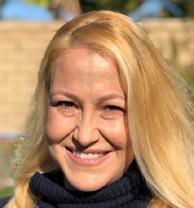
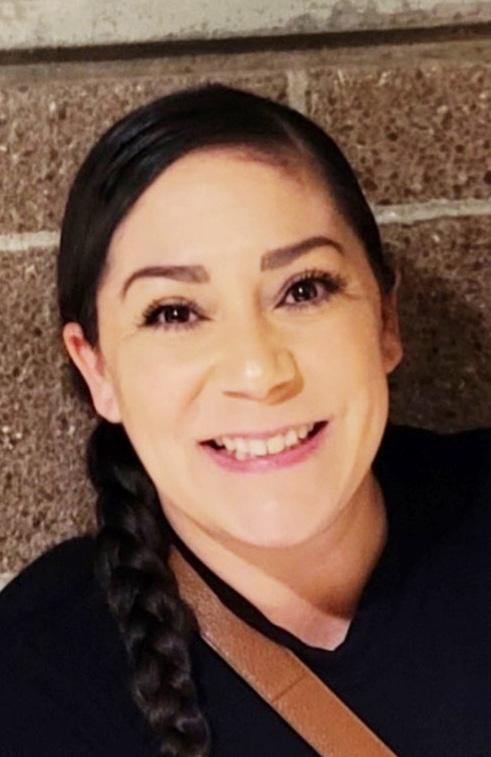
Jackie can be reached at (760) 327-0301 or jackie@thegaffneygroup.net.
Welcome aboard, Canyon Print & Signs! Canyon Print & Signs has been in business in the Coachella Valley for ten years. With two locations to serve you (Palm Springs and Cathedral City), they provide signage and printing for projects of any size. From business cards to illuminated monument signs, Canyon Print & Signs will designate a sales representative and customer service representative to your account, ensuring a high level of service to meet your needs. Be sure to ask them about their printing services, and if you need a wrap, they have you covered! With 20 employees and six service vehicles, free delivery service can also be provided.
Alan Moore is the contact for Canyon Print & Signs. A father of two (plus one new pup!), Alan grew up in Northern California. He is happy to now be in Southern California, servicing all of the Coachella Valley.
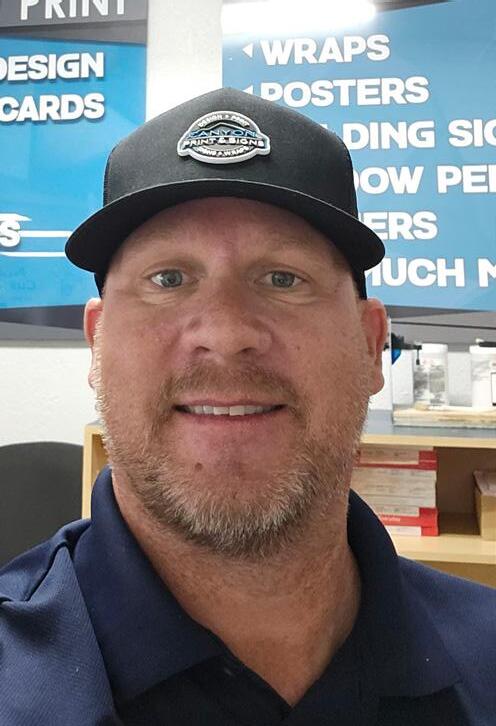
Alan Moore can be reached at (840) 210 5351 or alan@canyonps.com.
Canyon Print & Signs Address: 67990 E. Palm Canyon Drive Cathedral City, CA 92234
In addition to CAI-CV, Canyon Print & Signs is active with numerous local Chamber of Commerce and Realtors associations.
Please contact Alan at Canyon Print & Signs or visit www.canyonps. com for more information on their services that can benefit your community!
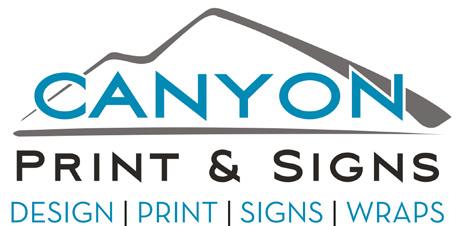 Alan Moore
Jackie Smith, CCAM
Alan Moore
Jackie Smith, CCAM
I have found being a sponsor at events brings me closer to managers and better able to develop closer and more personal relationships with them. This has helped my business grow by getting to know them personally and how I can best assist them. Additionally, by being a sponsor many managers recognize and appreciate your commitment to them and to the industry as a whole. This gives you enhanced credibility and creates a higher comfort level for them. This in turn makes it more desirable for them to turn to someone who they are most comfortable with when an RFP is needed.
Brian Berce, President Golden Alliance InsuranceCAI has been instrumental in my expertise in servicing Common Interest Developments. Since 2009, CAI has increased my knowledge on how to better serve the communities we insure and how to best service all types of communities. CAI has also formed some really solid relationships with managers as well as other vendors, which has helped me increase my involvement in the industry.
Mike Rey, Farmers Agent Rey Insurance ServicesBy sponsoring events, companies enjoy perks that typically include the following: Increased brand exposure, advertising, new connections, established relationships and growing your business year over year. Thank you,
Britain L. RomeBusiness Development Manager - Inland Empire Southwest Division
Allied Universal Security Services
Sponsoring CAI Coachella Valley has been pivotal in expanding both my professional network and business prospects. Through their support, we've tapped into a broader audience, fostering connections that have translated into both remarkable business expansion and lasting friendships.
Amanda Gray, VP of MarketingHarvest Landscape Enterprises, Inc.
Becoming a corporate sponsor with CAI-CV has allowed me to gain regular exposure with community managers. The chapter does a phenomenal job of making sure my company is listed in all marketing documents including the monthly magazine. Additionally, when I sponsor events, I get additional recognition via beautiful signage and on the regular email blasts leading up to the event. All this exposure keeps my company top of mind. I have found that community managers often prefer to support corporate sponsors as they know we are what keeps the chapter operational and the networking/educational events possible. Lastly, the sponsorship always comes with an entrance to the event allowing me to further develop relationships with our client base. I am grateful for the exposure and recognition of sponsorship dollars. Thank you CAI-CV!
Bridget Nigh Behr Paint/Kilz Primer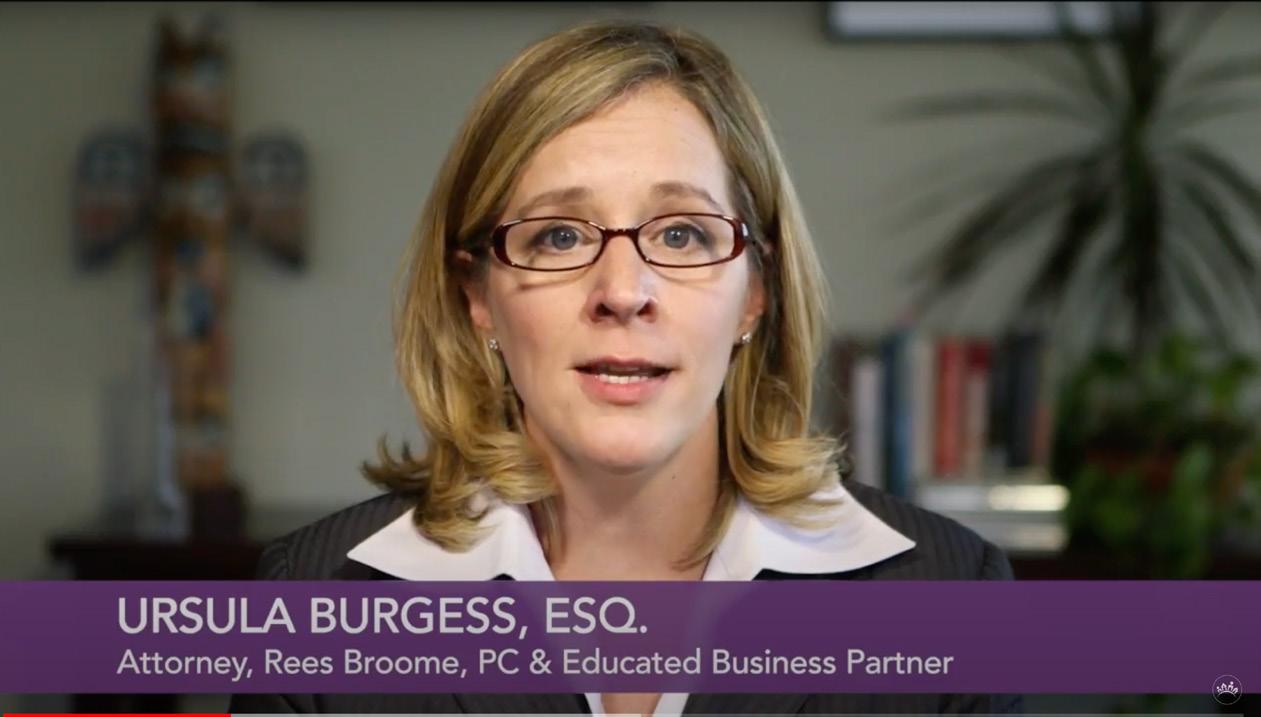
CAI business partners, you are essential. We think about you often and want to better understand your larger goals and how we can help. We're creating an experience to support and show you how to put your CAI membership to work.
VISIT THE NEW BUSINESS PARTNER TOOLKIT, DESIGNED IN PARTNERSHIP WITH CAI’S BUSINESS PARTNERS COUNCIL. CLICK HERE
• NEW Resources: Featuring best practices and strategies for networking, presentations, and attracting new clients.
• Business Partner Essentials: Showcase your skills. CAI business partner designations that make our professionals stand out.
CAI chapter and headquarters events are the best way to make valuable connections that drive business success.
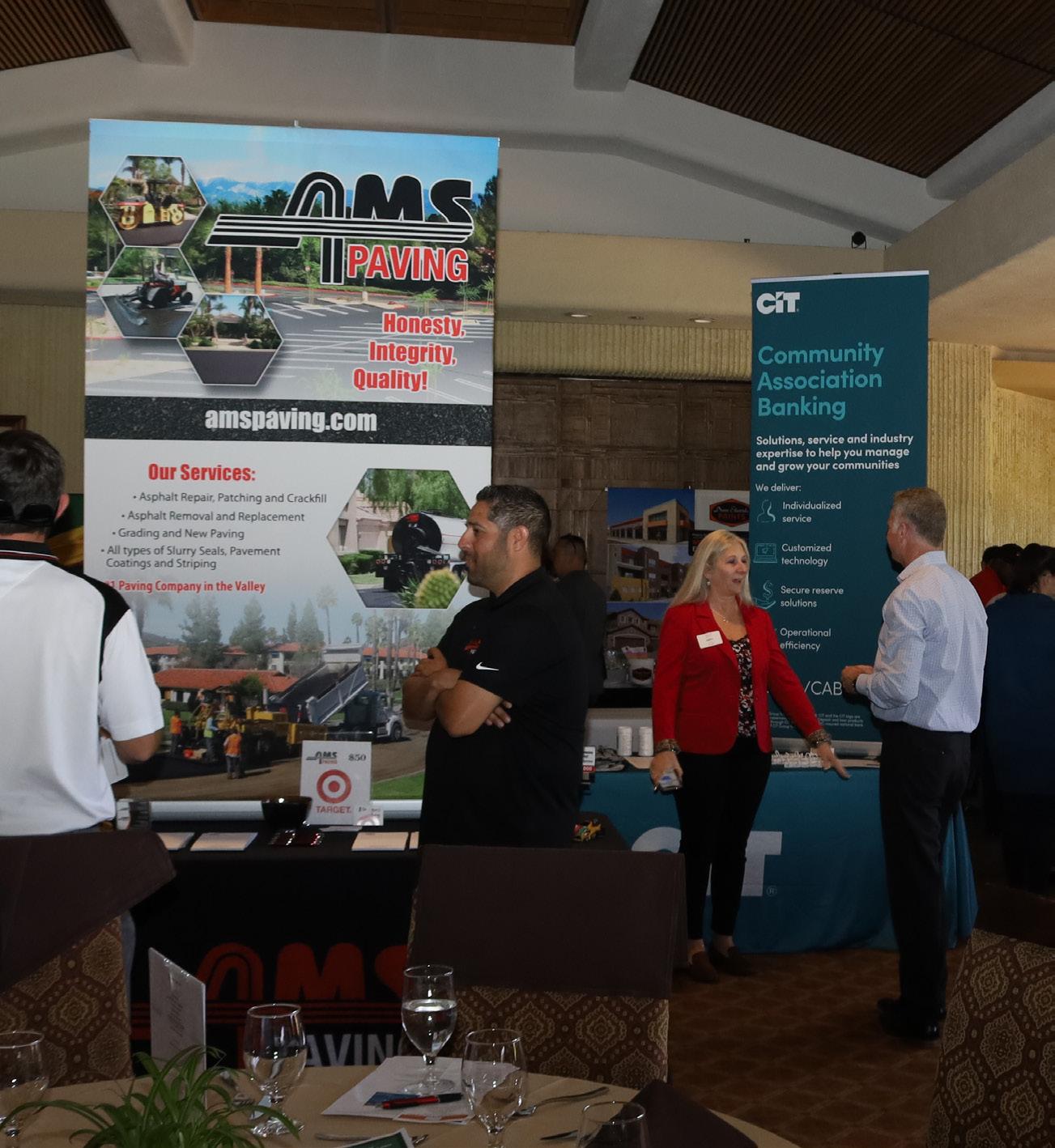
 By Christina Baine DeJardin, Esq.
By Christina Baine DeJardin, Esq.
Since the Common Interest Development Open Meeting Act (“Act”) took effect, most HOA managers and attorneys have been operating on the premise that email discussions between board members constitute an illegal meeting. However, a new California Court of Appeal case just turned this on its head.

In LNSU #1 v. Alta Del Mar Coastal Collection Community Association, the plaintiff homeowners sued the defendant association for, among other things, conducting board meetings and taking action on association business via email in violation of the Act. The homeowners pointed to several email exchanges between four of the directors as evidence of this violation. Early in the litigation, the association admitted that
this was a violation of the Act. However, it later changed its position and argued that the emails were not board meetings within the meaning of the Act because the directors were not in the same place at the same time when they exchanged the emails and, further, because the directors took no action in the emails. The homeowners argued that the emails did violate the Act because the association failed to provide notice and an agenda, not all members could attend and speak, and no minutes were prepared. The trial court ruled in favor of the association and the homeowners subsequently appealed.
The fundamental issue on appeal was whether Civil Code Section 4090 of the Act, which defines the term “board meeting,” prohibits email discussions
among the directors. Section 4090(a) defines a board meeting as a “congregation, at the same time and place, of a sufficient number of directors to establish a quorum of the board, to hear, discuss, or deliberate upon any item of business that is within the authority of the board.”
From a public policy standpoint, the appellant homeowners argued that such email discussions would undermine and frustrate the purpose of the Act, which is to permit members to have access to the board’s discussions and actions relating to association business. They argued that allowing directors to discuss issues in advance of a meeting would result in “mere theatre” to confirm the decisions. In addition, the homeowners argued that email communications constitute a
"...THE EMAILS WERE NOT BOARD MEETINGS WITHIN THE MEANING OF THE ACT BECAUSE THE DIRECTORS WERE NOT IN THE SAME PLACE AT THE SAME TIME WHEN THEY EXCHANGED THE EMAILS AND, FURTHER, BECAUSE THE DIRECTORS TOOK NO ACTION IN THE EMAILS."
congregation of the directors at the same time and place because directors are virtually assembling together to communicate simultaneously in cyberspace.
The Court of Appeal rejected this construction of the statute, claiming that it was not consistent with the usual and ordinary meanings of the words. The Court determined that a congregation at the same time and place means a physical gathering of the directors in the same room. The Court found that:
“…by sending e-mails to one another through cyberspace, often hours or days apart and from different homes and offices, the Association’s directors did not simultaneously gather in one location to transact board business….”

The Court ultimately held that the directors’ email communications did not qualify as a board meeting under the Act. The Court also held that they did not violate Civil Code Section 4910(a), which prohibits boards from taking action on any item of business outside of a board meeting, stating:
“By discussing items of Association business in e-mails..., the directors did nothing contrary to the purpose of the OMA (i.e., the Act), because they took no action on those items in the e-mails. Although the OMA prohibits the board from acting on items of Association business outside a board meeting (§4910, subd. (a)), it does not prohibit the board from discussing the items outside a meeting….”
While this case is technically a win for association boards, it raises a host of issues.
The first problem is finding the line between discussion and decision. The Court of Appeal sanctioned the email communications not only because they did not fall within the dictionary definitions of the words in the statute, but because the directors did not actually make any decisions in those communications. There is a fuzzy, gray area between discussion and decision where it is unclear whether the directors are just discussing the merits of an issue or have actually agreed to a certain course
of action. If, in the course of discussion, the directors generally agree or disagree on a matter but haven’t formally made a motion and taken a vote, is that a decision? Directors may inadvertently step over the line and chime in with their agreement or disagreement before they realize they’ve now collectively made a decision.
There is also the issue of transparency. Homeowners are often heard to complain about a lack of transparency on their boards and that they never know why certain decisions were made. Under this new paradigm, transparency may take a serious hit. The ease, convenience and privacy of email discussions may simply be too tempting for boards. As the plaintiff homeowners contended, meetings may become “mere theatre” with directors walking in with scripted motions and no discussion. Admittedly, this would avoid directors having to engage in awkward discussions in front of the membership. However, this deprives homeowners of observing that discussion and debate, perhaps leaving them confused as to how the Board came to a particular decision.
In closing, it is important to note that this case, while binding on homeowners associations, may potentially be appealed to the California Supreme Court. Or perhaps the legislature will decide to tighten up the Act so that it is clear that discussions in email constitute illegal meetings of the board. In any event, it is important that boards exercise diligence and caution when emailing each other between meetings. When in doubt, they should confer with legal counsel to ensure that they stay on the right side of this new law.
Christina Baine DeJardin, Esq. is an attorney for the Delphi Law Group, LLP.
She is a past president of the Chapter and serves on the Programs Committee and on CAI-CV’s Legislative Support Committee. Christina is also one of the Chapter’s two Delegates to the California Legislative Action Committee (CLAC). Christina may be reached at (844) 433-5744, extension 705, or by email at cdejardin@delphillp.com.
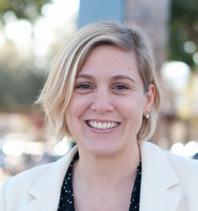
"THE COURT DETERMINED THAT A CONGREGATION AT THE SAME TIME AND PLACE MEANS A PHYSICAL GATHERING OF THE DIRECTORS IN THE SAME ROOM."

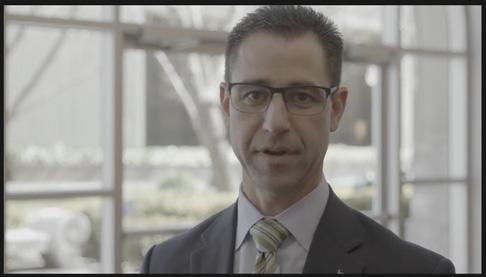

Just tap SPONSORS for one-touch access to CAI-CV’s vast resource of trusted service



49950 Jefferson Street, Suite 130-117 Indio, CA 92201
CAI-CV AND DCHC BOARD MEMBER WORKSHOP (BMW)
(For board members)
WHEN: Tuesday, October 3, 2023, 9:30 a.m.
(Social/Networking) 10:00 a.m. Program
WHERE: Via Zoom
TOPIC: Insurance
REGISTER:
SPONSORSHIPS:
CAI-CV MANAGER ON THE RUN (MOTR)
(For managers and assistant managers)
WHEN: Tuesday, October 5, 2023, 8:30 a.m.
WHERE: Via Zoom
TOPIC: Insurance
REGISTER:
SPONSORSHIPS:
CAI-CV EDUCATIONAL BREAKFAST PROGRAM & MINI TRADE SHOW
WHEN: Friday, October 13, 2023, 8:00 a.m.
WHERE: Sun City Palm Desert
TOPIC: Dealing with Anger & High Conflict People
REGISTER:
SPONSORSHIPS:
CAI-CV OKTOBERFEST
WHEN: Friday, October 20, 2023, 5:30 p.m.
WHERE: Sunshine Landscape, Thousand Palms
REGISTER:
SPONSORSHIPS:
SIGN UP FOR LOCAL EVENTS AT CAI-CV.ORG
FOR CAI NATIONAL EVENTS AT CAIONLINE.ORG
TITANIUM
AMS Paving, Inc.
Asphalt MD’s Associa DRM
C. L. Sigler & Associates
Fiore Racobs & Powers, A PLC
Gardner Outdoor and Pool Remodeling
Signarama
Sunshine Landscape
Vantage Point Construction
LEGISLATIVE UPDATE
(For all members)
CAI-CV’s EDUCATIONAL LUNCH PROGRAM & MINI TRADE SHOW
WHEN: Friday, November 10, 2023, 11:00 a.m.
WHERE: Sun City Palm Desert
TOPIC: New HOA Laws & Regulations
REGISTER:
SPONSORSHIPS:
TIKI TEE TIME – HAPPY HOUR GOLF
(For all members)
CAI-CV’S ANNUAL FALL 9-HOLE GOLF TOURNAMENT
WHEN: Thursday, November 16, 2023, 1:30 p.m.
WHERE: Shadow Mountain Golf Club, Palm Desert
REGISTER:
SPONSORSHIPS:
SIPS & SHOTS WINE & TEQULA TASTING
(For all members)
CAI-CV’s ANNUAL CORKS FOR CLAC
WHEN: Friday, December 1, 2023, 5:30 p.m.
WHERE: Shields Date Garden, Indio
REGISTER:
SPONSORSHIPS:
ASK THE ATTORNEY PROGRAM
(For mangers & board members)
COMBINED MANAGER ON THE RUN (MOTR) & BOARD MEMBER WORKSHOP (BMW)
WHEN: Friday, December 1, 2023, 3:30 p.m.
WHERE: Shields Date Garden Theater, Indio REGISTER:
SPONSORSHIPS:
WATCH FOR THE CAI-CV MONDAY UPDATE WITH ALL EVENTS AND PROGRAMS
PLATINUM
Prendiville Insurance Agency
GOLD
First Citizens Bank
Delphi Law Group, LLP
EmpireWorks
Epsten, APC
Flood Response
Precision Painting & Reconstruction
Western Pacific Roofing
SILVER
Accurate Termite & Pest Control
Alan Smith Pools
Behr Paint Company
Cooper Coatings, Inc.
Dunn-Edwards Corporation
Ivan's Painting & Maintenance
Nissho of California, Inc.
SCT Reserve Consultants
Tinnelly Law Group
Vintage Landscape
BRONZE Alliance Association Bank
Brightview Landscape Services
Broadband Agreements
Community Legal Advisors
First Service Residential
LaBarre/Oksnee Insurance Agency
PatioShoppers, Inc.
Popular Association Banking
Premier Community Association Mgmt.
Securitas Security Services
Sun King Electric Vista Paint